STANLEY KUBRICK'S BARRY LYNDON
Shot-by-Shot Analysis
Part Three

Go to TOC for this film ( (which has also a statement on purpose and manner of analysis and a disclaimer as to caveat emptor and my knowing anything authoritatively, which I do not, but I do try to not know earnestly, with some discretion, and considerable thought).
TOC and Supplemental Posts | Part 1 | Part 2 | Part 3 | Part 4 | Part 5 | Part 6 | Part 7 | Films Home
LINKS TO SECTIONS OF THE ANALYSIS ON THIS PAGE:
Lischen, Shots 255 through 284
Notes on Lischen. Book versus film. Where is this town?
Fakenham Uncovered as a Fake, Shots 285 through 323
Notes on Fakenham Uncovered as a Fake. Book versus film.
The problem of General Percival Williamson. The same town approached from two directions.
Rescuing Potzdorf, Shots 324 through 354
Notes on Rescuing Potzdorf. Book versus film. Award for a rescue as opposed to a kill.
The Violence in the Army and Barry's Later Caning of Lord Bullingdon
The Anatomy of Framing
The Minister of Police, Shots 355 through 367
Notes on The Minister of Police. Book versus film. The interview with the Minister of Police compared with the interview with Ullman. Locations.
Barry's Confession to the Chevalier, Shots 368 through 385
Notes on Barry's Confession to the Chevalier. Book versus film. Locations. Patrick Magee, from A Clockwork Orange, to Barry Lyndon.
A Prince Challenges the Chevalier, Shots 386 through 407
Notes on A Prince Challenges the Chevalier. Book versus film.
The Escape, Shots 408 through 425
Notes on The Escape. Book versus film.
Idomeno
How the Chevalier's Housing is Represented
255 LS of a forest, then Barry rides into view from the right and around a bend. Hohenfriedberger March begins. (52:52)
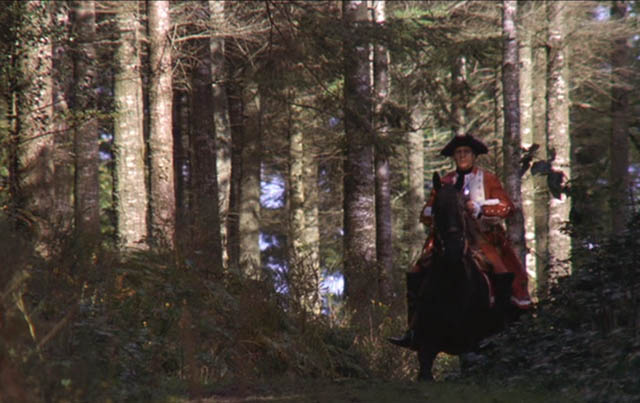
256 LS of Prussian soldier in blue coats lining a path, from Barry's left. (53:15)
NARRATION: Barry was very glad to see the blue and white uniforms of a company of Prussian infantry, which showed him that he was out of the land occupied by his own countrymen.
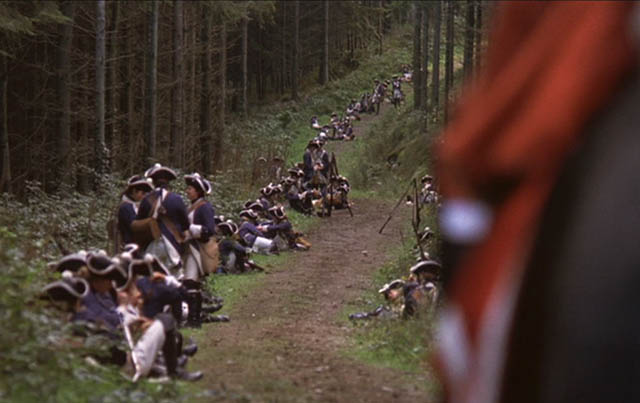
257 LS of village and tower at the end of a muddy path. Barry rides in from screen right. (53:35)
NARRATION: His intention was to make for Holland, almost the only neutral country of Europe in those times, and thence to get a passage home somehow. As he rode away, Barry felt...
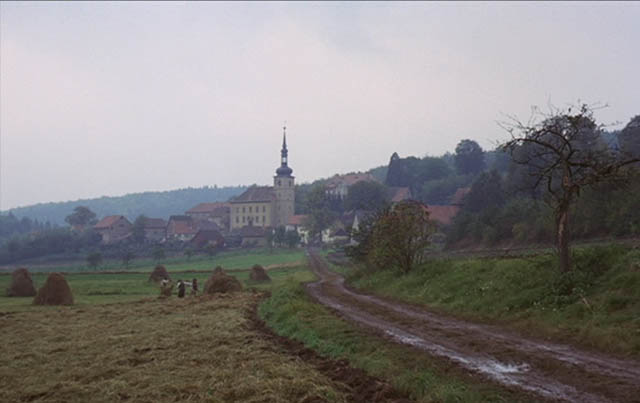
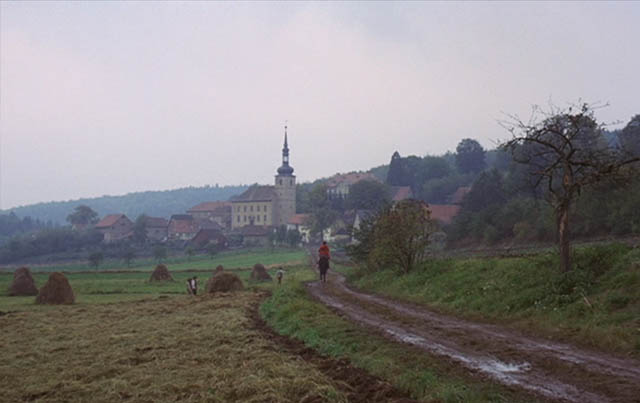
258 MLS of Barry astride riding toward the camera on a grassy path. (It has been pointed out to me he is no longer wearing his boots.) (53:51)
NARRATION:...once more he was in his proper sphere and determined never again to fall from the rank of a gentleman.
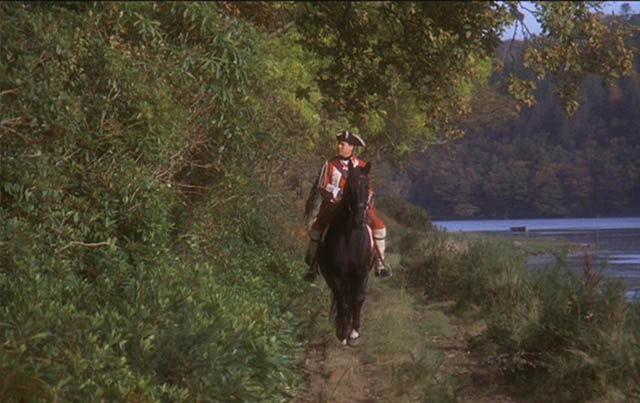
259 Opposing shot of a woman walking down the path with a donkey. Barry enters the frame from the right. (54:07)
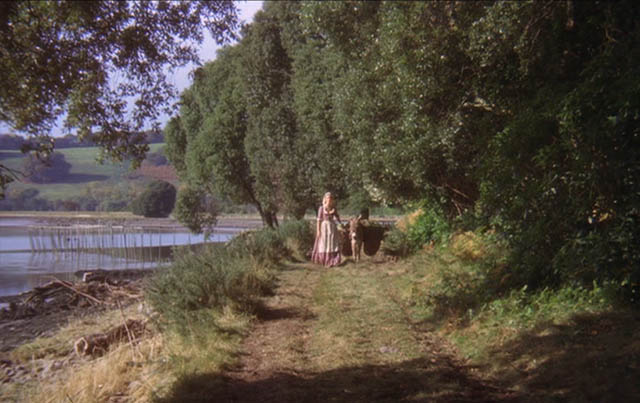
BARRY: Fraulein.
FRAULEIN: Jah.
BARRY: Guten tag.
FRAULEIN: Guten tag.
260 MS of Barry astride his horse. (54:32)
BARRY: Sprechen zie English?
261 MS of the woman. (54:35)
FRAULEIN (halting): I'm...speaking...little.
262 Return to shot 260 of Barry. (54:40)
BARRY: I've not eaten anything all day. No food. Is there an inn nearby where I might receive a meal?
263 Return to shot 261 of the woman. (54:51)
FRAULEIN: No, I don't think so. There is nothing...to eat something since (...)
264 Return to shot 262 of Barry. (55:01)
BARRY: Do you live near here?
265 MS of the woman. (55:05)
FRAULEIN: Jah.
266 Return to shot 263 of Barry. (55:10)
BARRY: Would you feed me something to eat? I'd be happy to pay you.
267 Return to shot 265 of the woman. (55:17)
FRAULEIN: I think so.
 260 |
 261 |
 262 |
 263 |
 264 |
 265 |
 266 |
 267 |
268 MS of Barry, the woman, and her child eating in her home, the scene lit by candles. (55:23)
Thunder.
BARRY: Is that a little boy or...
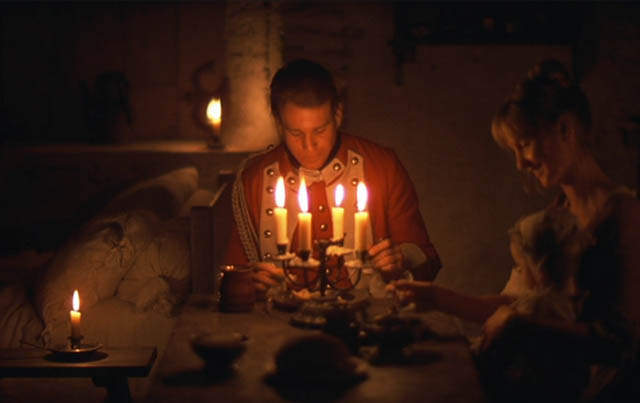
269 MS of the woman and child from Barry's right. (55:45)
BARRY: ...a little girl?
FRAULEIN: A boy.
BARRY: And what's his name?
FRAULEIN: Peter.
BARRY: And how old is he?
FAULEIN: Is one years old.
270 MS of Barry from the end of the table. (55:59)
BARRY: And where might Peter's father be?
271 The woman from Barry's right. (56:04)
FRAULEIN: You mean where is?
BARRY: Yes.
FRAULEIN: He's in the war.
272 Barry from the end of the table. (56:15)
BARRY: And how long has he been gone?
FRAULEIN: Sorry, I didn't understand. What?
BARRY: Vie longen...
273 MS of the woman and her child from Barry's right. (56:28)
BARRY: ...ist er (can't tell what's being said).
FRAULEIN: Oh, a long time. Since springtime.
274 MS of Barry from end of table. (56:35)
BARRY: Must be hard for you to be alone.
275 Return to the woman. (56:44)
FRAULEIN: It is. It must be very danger for you to be in the war.
276 Return to Barry. (56:56)
BARRY: I'm an officer and must do my duty.
277 Return to the woman. (57:03)
FRAULEIN: You are sometimes...
278 Return to Barry. (57:12)
FRAULEIN: ...lonely?
BARRY: Sometimes.
279 Return to the woman. (57:19)
FRAULEIN: What did you say your name was?
She places down the spoon with which she was feeding the infant. "Women of Ireland" music plays, as it had when Nora was seducing Barry. She and Barry hold hands.
280 Barry kisses her hand. (57:28)
FRAULEIN: What did you say? What's Your name?
BARRY: Lieutenant Fakenham.
FRAULEIN: I mean, what is the name before Fakenham?
BARRY: Meine forename?
FRAULEIN: Yes.
BARRY: Est Jonathan.
FRAULEIN: Jonathan, would you like...
281 Return to the woman. (57:57)
FRAULEIN: ...to stay with me, for a few days, or sometimes?
BARRY: That would be very nice.
They kiss.
 269 |
 270 |
 271 |
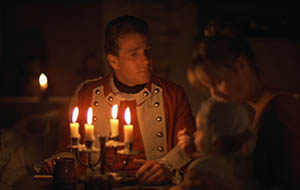 272 |
 273 |
 274 |
 275 |
 276 |
 277 |
 278 |
 279 |
 280 |
 281 | |
282 LS of the houses at the end of a street. (58:14)
A man enters from the right, leading cows, and continues down the lane.
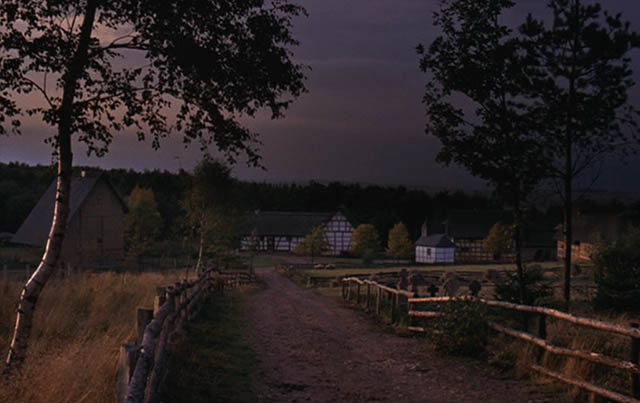
Just a beautiful shot.
283 MCU of Barry and the woman, daylight. (58:31)
BARRY: Auf wiedersehen, my beautiful Lischen.
FRAULEIN: Auf wiedersehen, Redmond. Ich liebe...
BARRY: Ich liebe dich.
She says a couple of other phrases and then they kiss.
NARRATION: A lady who sets her heart upon a lad in uniform, must prepare to change lovers pretty quickly, or her life will be but a sad one. This heart of Lischen's was like many a neighboring town...
The camera zooms out and pans left as Barry mounts his horse.
284 LS of Barry on his horse, riding away. (59:24)
NARRATION: ...and had been stormed and occupied several times before Barry came to invest it.
 283 |
 283 |
Barry initially introduces himself as Jonathan Fankenham, but by the time he and the woman part he is Redmond.
Of interest is how Kubrick directs Barry's movement in these scenes after he's changed identity and crossed the boundary into alien territory. After shot 255, movement often enters from lower right of frame and progresses to upper left away from the audience, such as in shots 256 of Barry entering Prussian territory, shot 257 of Barry riding toward a town, the man walking at sunrise in shot 282, and in shot 285 of Barry riding toward the same town as in shot 257 but from the opposite direction. The last of this type will be in shot 306 which is after Barry is taken into custody and is on his way to the Prussian fort.
Though there is a Lischen in Thackery's book, she is not a lone woman happened upon on the road, with whom the false Fakenham has a several night stand. In the screenplay, she and Barry have a scene of fond adieu, but her appearance is in conjunction with Barry's recovery from injury and sickness at an inn where she nurses him and also an ill Fakenham, Barry thieving the ill Fakenham's identity when he is sufficiently recovered.
With the novel, after Barry switches identities, we have one brief paragraph before he meets Potzdorf.
...so taking leave of the old blind Jagdmeister, and an adieu (I will not say how tender) of his daughter, I mounted my newly purchased animal; and, as I pranced away, and the sentinels presented arms to me at the town-gates, felt once more that I was in my proper sphere, and determined never again to fall from the rank of a gentleman.
I took at first the way towards Bremen, where our army was, and gave out that I was bringing reports and letters from the Prussian commandant of Warburg to headquarters; but, as soon as I got out of sight of the advanced sentinels, I turned bridle and rode into the Hesse-Cassel territory, which is luckily not very far from Warburg: and I promise you I was very glad to see the blue-and-red stripes on the barriers, which showed me that I was out of the land occupied by our countrymen. I rode to Hof, and the next day to Cassel, giving out that I was the bearer of despatches to Prince Henry, then on the Lower Rhine, and put up at the best hotel of the place, where the field-officers of the garrison had their ordinary. These gentlemen I treated to the best wines that the house afforded, for I was determined to keep up the character of the English gentleman, and I talked to them about my English estates with a fluency that almost made me believe in the stories which I invented. I was even asked to an assembly at Wilhelmshohe, the Elector's palace, and danced a minuet there with the Hofmarshal's lovely daughter, and lost a few pieces to his excellency the first huntmaster of his Highness.
Altering the scene with Lischen in this manner, though this episode has its touch of humor (Lischen has given her heart to many men), it is sentimental, presents the plight of the woman left at home, and makes Barry and Lischen more sympathetic despite her infidelity. A war story vignette of two lonely individuals seeking comfort where it avails itself in a time of trauma. Also, though Prussia is allied with the British, Barry is still on foreign soil, he has crossed a boundary into alien territory, and we've a portrait of desire and affairs of the heart bridging national and language barriers. Apparently, with this intimacy, Barry is unable to maintain his ruse as he kisses the woman as Jonathan but leaves as Redmond.
The thunder, as they eat, takes us back also to Barry and Nora in the shell house, it also raining and thundering during their game, but has also to do with Lischen having been "stormed and occupied" many times. As had Nora.
The location of this quaint village, presumably German, with its baroque onion dome church spire, seems like it would be easy enough to find on the internet due its picturesque quality, but I've had no luck finding it.
285 Shot of road leading toward village. Barry enters from the right of the frame to travel down the road. Hohenfriedberger March as in shot 255. (59:35)

This appears to be the same village as in 257, to which Barry was riding before his encounter with the woman, now approached from the opposite side. The action with Barry in these shots of him riding in Prussian territory are usually moving right to left away from the camera, whereas previously on his journeys he would be riding toward the camera directly or from a slight left to right angle.
286 Barry rides into a village toward the camera. (59:47)
Barry rides past the camera and it turns and follows him as he passes a Prussian officer leading a ragtag group of boys.
NARRATION: During the five years, which the war had now lasted, the great and illustrious Frederick had so exhausted the males of his kingdom, that he had to employ scores recruiters who would hesitate at no crime, including kidnapping, to keep supplied those brilliant regiments of his with food for powder.
 286 Barry coming |
 286 Barry going |
287 LS of Barry riding down a road by a stone wall. (1:00:31)
He passes the camera and it turns and follows at his back as he approaches a number of Prussians.
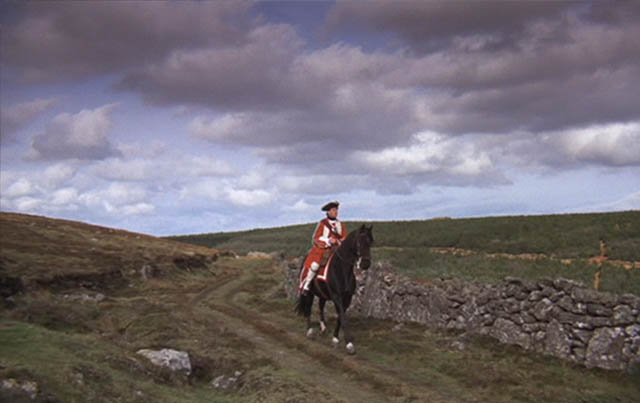
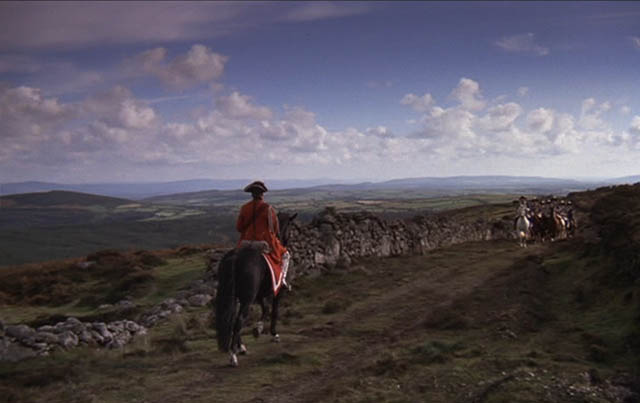
Beautiful shot. The light is remarkable.
288 Potzdorf rides forward to speak with Barry. (1:00:54)
POTZDORF: Good evening, sir. I'm Captain Potzdorf. May I ask to whom I have the honour of speaking?
289 MS Barry from beyond Potzdorf's left shoulder. (1:01:03)
BARRY: Good evening, Captain. I'm Lieutenant Fakenham, Gale's Regiment of Foot.
POTZDORF: Pleased to meet you.
290 Return to shot 288. (1:01:09)
POTZDORF: Can we be of some assistance to you, Lieutenant?
BARRY: Thank you, Captain, but I must continue on my way. I'm carrying urgent dispatches.
POTZDORF: May I ask your destination?
291 CU of Barry. (1:01:20)
BARRY: I'm traveling to Bremen.
292 Return to shot 290 or Potzdorg. (1:01:23)
POTZDORF: Bremen. Then you're obviously lost, Lieutenant, because Bremen is in the opposite direction.
BARRY: Ae you sure, Captain?
POTZDORF: Yes, I am.
293 MS of Barry. (1:01:34 or thereabouts)
BARRY: Well, wouldn't you know it! My departure was so hastily organized that my orderly forgot to prepare proper maps of the area.
POTZDORF: Of course, I understand.
294 MS of Potzdorf, Barry from the rear. (1:01:43)
POTZDORF: Please, do not be offended, Lieutenant, may I ask whether you are carrying your identity papers?
295 MS Barry. (1:01:51)
BARRY: Yes, of course I am.
296 MS of Potzdorf from behind Barry. (1:01:55)
POTZDORF: Would you allow me to see them?
297 CU of Barry. (1:01:57)
BARRY: Of course.
298 Potzdor, Barry from the rear. (1:02:01)
Barry hands his papers over to Potzdorf.
BARRY: Here you are.
POTZDORF: Thank you very much.
299 MS Barry. (1:02:09)
300 MS Potzdorf from behind Barry. (1:02:16)
POTZDORF: Thank you very much, Lieutenant. I hope I haven't inconvenienced you in any way.
301 Barry taking back his papers. (1:02:23)
BARRY: Not at all.
302 Potzdorf from behind Barry. (1:02:27)
POTZDORF: Now that we are riding in the same direction, I'd be very honored if you'd allow me to offer you a meal and a bed for the night and a proper map to be drawn up for the journey.
303 MS Barry. (1:02:38)
BARRY: Well, that's extremely kind of you, Captain, and I'd be honored...
304 CU Potzdorf. (1:02:43)
BARRY (off camera): ...to accept your invitation.
305 LS of Barry turning his horse around to proceed with Potzdorf. (1:02:47)
Hohenfriedberger March begins.
 288 |
 289 |
 290 |
 291 |
 292 |
 293 |
 294 |
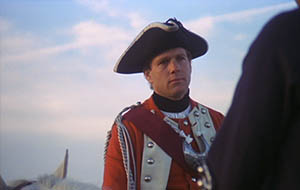 295 |
 296 |
 297 |
 298 |
 299 |
 300 |
 301 |
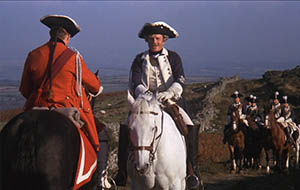 302 |
 303 |
 304 |
 305 |
306 LS of Prussians marching left to right before a castle. Barry and Potzdorf and group ride in from right to left. (1:03:02)
A number of blurs from bugs fly about in front of the camera.
NARRATION: Barry was treated with great civility, and was asked a thousand questions about England, which he answered as best he could, inventing a thousand stories. He described the King and the Ministers...
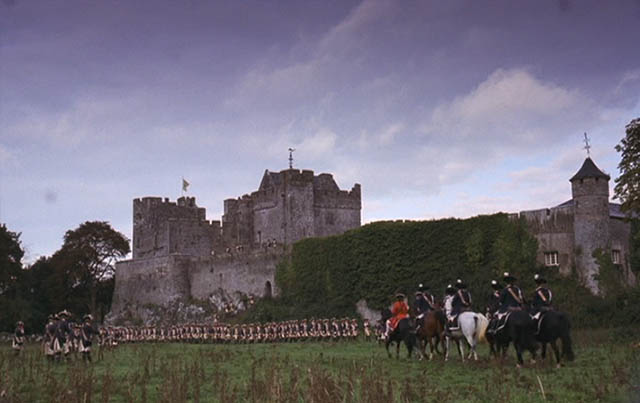
307 MLS of Barry and Potzdorf seated at a dining table. Night. Zoom out to show other Prussians in the dining room at their tables. (1:03:21)
NARRATION: ...boasted that the British Ambassador in Berlin was his uncle, and even offered Captain Potzdorf a letter of introduction. His host seemed quite satisfied with these stories. But at the same time he led Barry on with a skillful combination of questions...

308 MS of Potzdorf from beyond Barry's left. (1:03:38)
NARRATION: ...and flattery.
POTZDORF: You'll have to pardon me, I know so little of your country, except that you are
the bravest nation in the world and that we are really fortunate to have such allies. Lieutenant Fakenham, let us drink to the friendship of our two great nations.
BARRY (picking up his tumbler): To our two great nations.
309 MS of Barry and Potzdorf drinking. (1:04:04)
310 MS of Potzdorf. (1:04:15)
POTZDORF: Aren't you lucky, going to Bremen tomorrow. I know one of the loveliest women in Europe there. May I ask you to take a letter to her?
BARRY: Certainly.
POTZDORF: By the way, to whom are you carrying your dispatches?
311 MS of Barry from Potzdorf's left. (1:04:37)
BARRY: General Williamson.
312 MS of Potzdorf from Barry's right. (1:04:41)
POTZDORF: General Williamson?
BARRY: Yes.
POTZDORF: General Percival Williamson?
313 MS of Barry from Potzdorf's left. (1:04:49)
BARRY: Yes, the same.
314 MS of Potzdorf from Barry's right. (1:04:53)
POTZDORF: Sergeant!
315 LS of the room, Potzdorf rising from his chair. (1:04:59)
316 CU of Potzdorf. (1:05:03)
POTZDORF: This man is under arrest.
317 MS of Barry between the sergeant and Potzdorf. (1:05:05)
BARRY: Under arrest? Captain Potzdorf, sir, I'm a British Officer.
318 CU of Potzdorf. (1:05:14)
POTZDORF: You are a liar. You are an imposter. You're a deserter.
319 Return to shot 317 of Barry. (1:05:21)
POTZDORF: I suspected you this morning and your lies and folly have confirmed this to me.
320 CU of Potzdorf. (1:05:25)
POTZDORF: You pretend to carry dispatches to a General who has been dead these ten months. You say your uncle is the British Ambassador in Berlin with the ridiculous name...
321 Return to shot 319 of Barry. (1:05:35)
POTZDORF: ...of O'Grady.
322 CU of Potzdorf. (1:05:37)
POTZDORF: Now, will you join and take the bounty, sir, or will you be given up?
323 MS of Barry. (1:05:41)
BARRY: I volunteer.
 308 |
 309 |
 310 |
 311 |
 312 |
 313 |
 314 |
 315 |
 316 |
 317 |
 318 |
 319 |
 320 |
 321 |
 322 |
 323 |
The Prussian officer, in the book, who discloses Barry as a fake (which isn't too difficult) is not Potzdorf, but an individual named Galgenstein, and Barry takes considerable delight in relating how this Galgenstein was later hanged as a spy in France, his own identity in question. That story is too convoluted to go into here, nor is it necessary, but Thackeray thus grants some poetic justice. In the screenplay, as in the film, Kubrick compresses Galgenstein and Potzdorf into a single person. In the screenplay he retained the name of Galgenstein, while in the film we instead have the two rolled into Potzdorf.
Galgenstein was first met in an inn, traveled with Barry the following day, then revealed Barry as a fake that night, deceiving him into believing they were stopping at a regular inn and there calling his bluff.
The brutalities Barry witnesses and suffers in the book are far harsher than in the film, though Kubrick still manages to communicate the injustice of war and the class inequality (whether financial or by birth) that provides fodder for its terrible machine, often transforming into criminals those it does not kill.
Kubrick doesn't have Galgenstein/Potzdorf lashing Barry across the face with a whip so that a head injury he'd received earlier is reopened. Just as we also aren't treated to the worst of Barry's violences and stupidities.
At our table at the inn there was a Prussian officer who treated me with great civility, and asked me a thousand questions about England; which I answered as best I might. But this best, I am bound to say, was bad enough. I knew nothing about England, and the Court, and the noble families there; but, led away by the vaingloriousness of youth (and a propensity which I possessed in my early days, but of which I have long since corrected myself, to boast and talk in a manner not altogether consonant with truth), I invented a thousand stories which I told him; described the King and the Ministers to him, said the British Ambassador at Berlin was my uncle, and promised my acquaintance a letter of recommendation to him. When the officer asked me my uncle's name, I was not able to give him the real name, and so said his name was O'Grady: it is as good a name as any other, and those of Kilballyowen, county Cork, are as good a family as any in the world, as I have heard. As for stories about my regiment, of these, of course, I had no lack. I wish my other histories had been equally authentic.
On the morning I left Cassel, my Prussian friend came to me with an open smiling countenance, and said he, too, was bound for Dusseldorf, whither I said my route lay; and so laying our horses' heads together we jogged on. The country was desolate beyond description. The prince in whose dominions we were was known to be the most ruthless seller of men in Germany. He would sell to any bidder, and during the five years which the war (afterwards called the Seven Years' War) had now lasted, had so exhausted the males of his principality, that the fields remained untilled: even the children of twelve years old were driven off to the war, and I saw herds of these wretches marching forwards, attended by a few troopers, now under the guidance of a red-coated Hanovarian sergeant, now with a Prussian sub-officer accompanying them; with some of whom my companion exchanged signs of recognition.
'It hurts my feelings,' said he, 'to be obliged to commune with such wretches; but the stern necessities of war demand men continually, and hence these recruiters whom you see market in human flesh. They get five-and-twenty dollars from our Government for every man they bring in. For fine men—for men like you,' he added, laughing, 'we would go as high as a hundred. In the old King's time we would have given a thousand for you, when he had his giant regiment that our present monarch disbanded.'
'I knew one of them,' said I, 'who served with you: we used to call him Morgan Prussia.'
'Indeed; and who was this Morgan Prussia?'
'Why, a huge grenadier of ours, who was somehow snapped up in Hanover by some of your recruiters.'
'The rascals!' said my friend: 'and did they dare take an Englishman?'
''Faith this was an Irishman, and a great deal too sharp for them; as you shall hear. Morgan was taken, then, and drafted into the giant guard, and was the biggest man almost among all the giants there. Many of these monsters used to complain of their life, and their caning, and their long drills, and their small pay; but Morgan was not one of the grumblers. "It's a deal better," said he, "to get fat here in Berlin, than to starve in rags in Tipperary!"'
'Where is Tipperary?' asked my companion.
'That is exactly what Morgan's friends asked him. It is a beautiful district in Ireland, the capital of which is the magnificent city of Clonmel: a city, let me tell you, sir, only inferior to Dublin and London, and far more sumptuous than any on the Continent. Well, Morgan said that his birthplace was near that city, and the only thing which caused him unhappiness, in his present situation, was the thought that his brothers were still starving at home, when they might be so much better off in His Majesty's service.
'"'Faith," says Morgan to the sergeant, to whom he imparted the information, "it's my brother Bin that would make the fine sergeant of the guards, entirely!"
'"Is Ben as tall as you are?" asked the sergeant.
'"As tall as ME, is it? Why, man, I'm the shortest of my family! There's six more of us, but Bin's the biggest of all. Oh! out and out the biggest. Seven feet in his stockin-FUT, as sure as my name's Morgan!"
'"Can't we send and fetch them over, these brothers of yours?"
'"Not you. Ever since I was seduced by one of you gentlemen of the cane, they've a mortal aversion to all sergeants," answered Morgan: "but it's a pity they cannot come, too. What a monster Bin would be in a grenadier's cap!"
'He said nothing more at the time regarding his brothers, but only sighed as if lamenting their hard fate. However, the story was told by the sergeant to the officers, and by the officers to the King himself; and His Majesty was so inflamed by curiosity, that he actually consented to let Morgan go home in order to bring back with him his seven enormous brothers.'
'And were they as big as Morgan pretended?' asked my comrade. I could not help laughing at his simplicity.
'Do you suppose,' cried I, 'that Morgan ever came back? No, no; once free, he was too wise for that. He has bought a snug farm in Tipperary with the money that was given him to secure his brothers; and I fancy few men of the guards ever profited so much by it.'
The Prussian captain laughed exceedingly at this story, said that the English were the cleverest nation in the world, and, on my setting him right, agreed that the Irish were even more so. We rode on very well pleased with each other; for he had a thousand stories of the war to tell, of the skill and gallantry of Frederick, and the thousand escapes, and victories, and defeats scarcely less glorious than victories, through which the King had passed. Now that I was a gentleman, I could listen with admiration to these tales: and yet the sentiment recorded at the end of the last chapter was uppermost in my mind but three weeks back, when I remembered that it was the great general got the glory, and the poor soldier only insult and the cane.
'By the way, to whom are you taking despatches?' asked the officer.
It was another ugly question, which I determined to answer at hap-hazard; and so I said 'To General Rolls.' I had seen the general a year before, and gave the first name in my head. My friend was quite satisfied with it, and we continued our ride until evening came on; and our horses being weary, it was agreed that we should come to a halt.
'There is a very good inn,' said the Captain, as we rode up to what appeared to me a very lonely-looking place.
'This may be a very good inn for Germany,' said I, 'but it would not pass in old Ireland. Corbach is only a league off: let us push on for Corbach.'
'Do you want to see the loveliest woman in Europe?' said the officer. 'Ah! you sly rogue, I see THAT will influence you;' and, truth to say, such a proposal WAS always welcome to me, as I don't care to own. 'The people are great farmers,' said the Captain, 'as well as innkeepers;' and, indeed, the place seemed more a farm than an inn yard. We entered by a great gate into a Court walled round, and at one end of which was the building, a dingy ruinous place. A couple of covered waggens were in the court, their horses were littered under a shed hard by, and lounging about the place were some men and a pair of sergeants in the Prussian uniform, who both touched their hats to my friend the Captain. This customary formality struck me as nothing extraordinary, but the aspect of the inn had something exceedingly chilling and forbidding in it, and I observed the men shut to the great yard-gates as soon as we were entered. Parties of French horsemen, the Captain said, were about the country, and one could not take too many precautions against such villains.
We went into supper, after the two sergeants had taken charge of our horses; the Captain, also, ordering one of them to take my valise to my bedroom. I promised the worthy fellow a glass of schnapps for his pains.
A dish of fried eggs-and-bacon was ordered from a hideous old wench that came to serve us, in place of the lovely creature I had expected to see; and the Captain, laughing, said, 'Well, our meal is a frugal one, but a soldier has many a time a worse:' and, taking off his hat, sword-belt, and gloves, with great ceremony, he sat down to eat. I would not be behindhand with him in politeness, and put my weapon securely on the old chest of drawers where his was laid.
The hideous old woman before mentioned brought us in a pot of very sour wine, at which and at her ugliness I felt a considerable ill-humour.
'Where's the beauty you promised me?' said I, as soon as the old hag had left the room.
'Bah!' said he, laughing, and looking hard at me: 'it was my joke. I was tired, and did not care to go farther. There's no prettier woman here than that. If she won't suit your fancy, my friend, you must wait a while.'
This increased my ill-humour.
'Upon my word, sir,' said I sternly, 'I think you have acted very coolly!'
'I have acted as I think fit!' replied the captain.
'Sir,' said I, 'I'm a British officer!'
'It's a lie!' roared the other, 'you're a DESERTER! You're an impostor, sir; I have known you for such these three hours. I suspected you yesterday. My men heard of a man escaping from Warburg, and I thought you were the man. Your lies and folly have confirmed me. You pretend to carry despatches to a general who has been dead these ten months: you have an uncle who is an ambassador, and whose name forsooth you don't know. Will you join and take the bounty, sir; or will you be given up?'
'Neither!' said I, springing at him like a tiger. But, agile as I was, he was equally on his guard. He took two pistols out of his pocket, fired one off, and said, from the other end of the table where he stood dodging me, as it were,—
'Advance a step, and I send this bullet into your brains!' In another minute the door was flung open, and the two sergeants entered, armed with musket and bayonet to aid their comrade.
The game was up. I flung down a knife with which I had armed myself; for the old hag on bringing in the wine had removed my sword.
'I volunteer,' said I.
'That's my good fellow. What name shall I put on my list?'
'Write Redmond Barry of Bally Barry,' said I haughtily; 'a descendant of the Irish kings!'
In the book, not in the movie, we've the recurring plaint of Barry's that he is a descendant of royalty. At the beginning of the next chapter in the novel, Barry meets another individual to whom he protests that he is descended from kings, going so far as to avow that he is descended from Japhet (who came to be legendarily considered the progenitor of caucasians) and Nebuchadnezzar. His new friend then gave him a history lesson, telling him these personages couldn't be "authentically vouched for in history", and Barry received the lesson with interest as truth.
Eventually, in his tales, Barry relates how he came again upon Fakenham, who had been forced to go about as a private in Barry's corporal coat since Barry had stolen his uniform.
There was no General Percival Williamson. In the book, Barry picked the name haphazard from his knowledge of officers. Fakenham was to deliver the message to Prince Henry. We don't know, as there was no General Percival Williamson, if Kubrick intended the name to belong to a person who has died, or if Potzdorf is only testing Barry. What interests me is Percival is a legendary figure, the hero of the Arthurian grail quest. Of noble birth, he is raised in the forest by his mother after his father's death. She has intended to keep him an innocent with no knowledge of knights and the court, but when he is fifteen he sees some knights in the woods, is greatly impressed by them, decides they are magnificent and heroic and that he wants to be a noble knight himself. Much to his mother's horror, he takes off to join King Arthur's court. This is very like Barry who, in adolescence, becomes jealous of the uniform and supposed prestige of the warrior, and though he doesn't leave home to become a soldier he ends up becoming a soldier anyway. Percival eventually meets the Fisher King, but as he has been advised not to appear curious about things, he doesn't question the magic he observes at the court, and doesn't ask "the question" that would heal the Fisher King of a mysterious wound that incapacitates him. Many adventures follow in which he learns about himself. One day he fights a man who is victorious over him but doesn't kill him as there is no point in it. Percival learns this is his brother and says, "I was against my own self". At that moment, his name appears on the Grail, making him the new Grail King. The grail is later associated with Christ's cup, but originally drives from a cauldron of regeneration. There are many variations on the tale and no reason to go into them.
Barry, we will find, is a form of Fisher King. The Fisher King's wound is believed by some to be castration, for which reason in some tales he is unable to bear a son to take his place, but he is also lamed and sometimes paralyzed so he cannot walk, for which reason he occupies himself with fishing. We will see the same with Barry as well, in the eventual losing of his leg during his duel with Bullingdon, when he refuses to shoot him and Bullingdon takes his shot at Barry anyway. Though Kubrick considerably alters the tale, we need to consider why he brings Percival into the mix.
It could be said that it's a matter of pure convenience that has Barry approaching Lischen's town in shot 257, then after he leaves her, supposedly continuing on his way, he has Barry approaching the same town from the other side in shot 285. Rather than accidental, I believe this is purposeful as, in The Shining, the Overlook nas only one road that leads up to it, the Sidewinder, but in the opening Jack approaches it from the east, whereas when he rides up with his family they approach it from the west, which is impossible. I write of this at some length in my analysis of the movie and how we can map it so that we find the Overlook is placed on the Continental Divide. Leischen is said to be sometimes derivative of Lilian, which in Hebrew is Lila or Lilith, night, a turning away from the light. I discuss Lilith at length in my analysis of Lolita and won't go into that here, but we need to consider Lischen as symbolizing Barry having taken a turn, which we can most readily see in his leaving the red coat behind and taking up the blue coat of the Prussian army.
324 MS of Barry in Prussian uniform leading a man down between two lines of men who are flogging him across his bare back. (1:05:48)
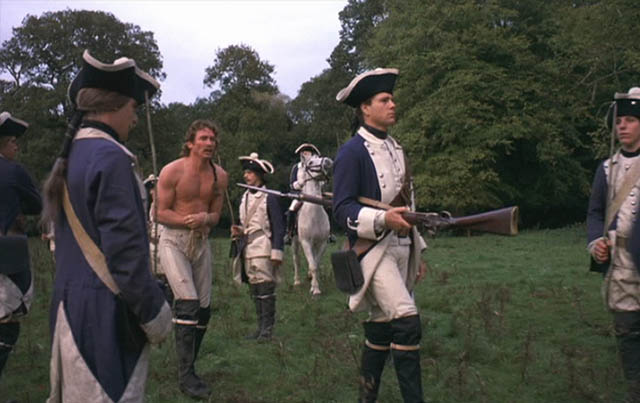
NARRATION: The Prussian Service was considerably worse than the English. The life that the private soldier led was a frightful one. Punishment was incessant and every Officer had the right to inflict it.
325 View of the man being flogged from 3/4 rear. (1:06:09)
Begin fife and drums version of Hohenfriedberger March.
NARRATION:The gauntlet was the most common penalty for minor offences. The more serious ones were punishable by mutilation or death.
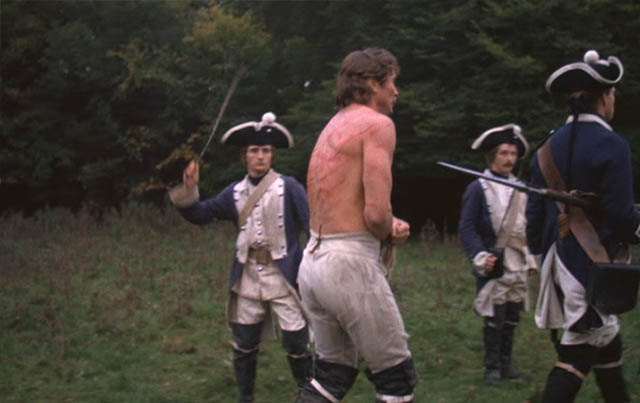
326 Shot of Barry and other soldiers marching toward the camera. (1:06:26)
NARRATION: At the close of the Seven Years' War, the army, so renowned for its disciplined valour, was officered by native Prussians.
327 Soldiers marching off center left in the distance to out of frame right. (1:06:45)
NARRATION: But it was mostly composed, for the most part, of men from the lowest levels of humanity, hired or stolen, from almost every nation...
328 Soldiers marching toward the camera, Potzdorf on his horse in the front. (1:06:58)
NARRATION: ...in Europe. Thus, Barry fell into the very worst of company, and was soon...
329 MS of Barry marching with soldiers. (1:07:08)
NARRATION: ...far advanced in the science of every kind of misconduct.
 326 |
 327 |
 328 |
 329 |
330 View of fighting through gun hole in wall. (1:07:16)
This is much like a shot in Paths of Glory.

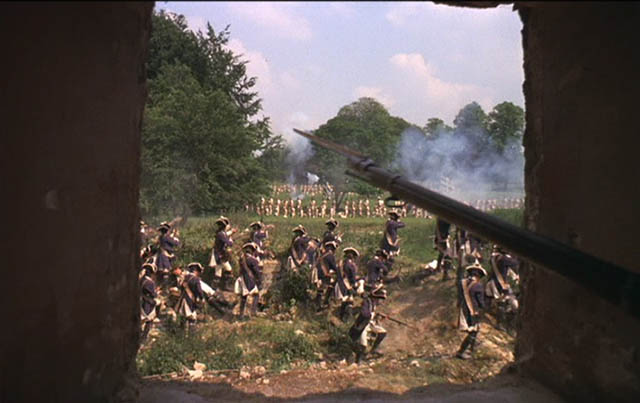
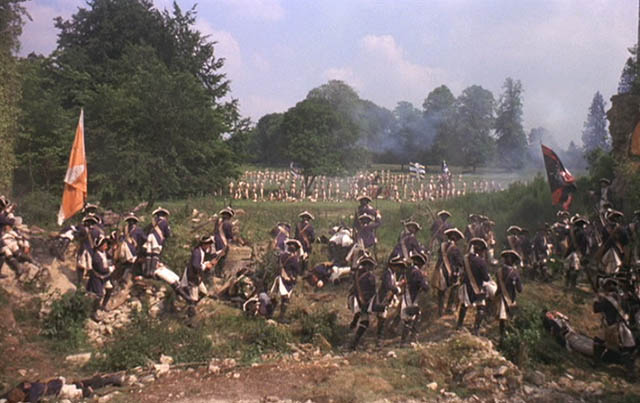
331 Barry reloading his rifle. (1:07:43)
332 Barry shoots out the window. (1:07:52)
333 Potzdorf walks down a trench lined with dead men, the camera panning with him as he passes a fire. (1:08:00)
334 CU Barry shooting out the window. (1:08:17)
335 Potzdorf climbs to the second floor of a building, a fire on the second floor. (1:08:21)
He continues walking toward the camera, passing soldiers shooting out windows.
336 MS of Potzdorf and several soldiers from behind. (1:08:46)
337 Exterior shot of enemy cannon going off. (1:08:48 about)
338 Exterior shot of battle as through the window. (1:08:50)
339 MS of Potzdorf and the other men as cannon strikes and fire erupts. (1:08:52)
340 MS of Potzdorf as a beam falls down on him. (1:08:58)
341 Barry lying on the ground, fire beyond and a soldier escaping. Other soldiers follow as Barry rises and looks toward where Potzdorf is trapped and yelling. (1:09:02)
342 Potzdorf trapped under the beam. (1:09:12)
343 View back toward the staircase. (1:09:19)
Barry stands and goes to Potzdorf's aid.
344 Opposing view of Barry lifting the beam, having moved a stone nearby on which to place it. (1:09:34)
He picks up Potzdorg and continues toward the camera.
345 Barry from behind as he carries Potzdorf out. (1:09:55)
 331 |
 332 |
 333 |
 334 |
 335 |
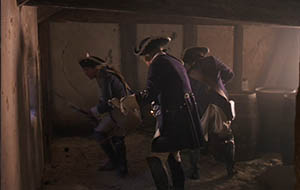 336 |
 337 |
 338 |
 339 |
 340 |
 341 |
 342 |
 343 |
 344 |
 345 |
|
346 LS of Soldiers in courtyard of castle. (1:10:12)
347 MS of Potzdorf and other officers. (1:10:26)
NARRATION: The Colonel's speech declared that the king had expressed his satisfaction...
348 MS of Barry standing before the troops. (1:10:41)
NARRATION: ...with the conduct of the Regiment at the Battle of Audorf, and that the bravery of Corporal Barry, in rescuing Captain Potzdorf...
349 Return to shot 346. (1:10:52)
NARRATION: ...was to be especially rewarded with the sum of two frederick d'or.
350 Return to shot 347. (1:11:00)
OFFICER: Corporal Barry, eight paces forward...
351 Return to shot 349. (1:11:07)
OFFICER: March!
Barry marches forward.
352 MCU of Barry. (1:11:16)
COLONEL: Corporal Barry.
353 MS from side of Barry receiving the reward. (1:11:24)
COLONEL: You're a gallant soldier and have evidently come of good stock, but you're idle, desolate, and unprincipled. You've done a great deal of harm to the men, and for all your talents and bravery, I'm sure you will come to no good.
BARRY: I hope the Colonel is mistaken regarding my character. I have fallen into bad company, that is true, but I've only done as other soldiers have done, and above all I've never had a kind friend or protector before to show that I was worthy of better things. The Colonel may say I'm a ruined lad, and send me to the Devil. But be sure of this, I would go to the Devil to serve the Regiment.
OFFICER: Corporal Barry...
354 Return to LS of the scene. (1:12:12)
OFFICER: ...fall in.
Music starts. The march from Mozart's Idomeneo.
 346 |
 347 |
 348 |
 349 |
 350 |
 351 |
 352 |
 353 |
 354 |
|
The book describes the punishment inflicted on the Prussians while the movie shows the whippings with the cane rather than going into brutal exposition.
I am not going to give any romantic narrative of the Seven Years' War. At the close of it, the Prussian army, so renowned for its disciplined valour, was officered and under-officered by native Prussians, it is true; but was composed for the most part of men hired or stolen, like myself, from almost every nation in Europe. The deserting to and fro was prodigious.
...
The life the private soldier led was a frightful one to any but men of iron courage and endurance. There was a corporal to every three men, marching behind them, and pitilessly using the cane; so much so that it used to be said that in action there was a front rank of privates and a second rank of sergeants and corporals to drive them on. Many men would give way to the most frightful acts of despair under these incessant persecutions and tortures...
...
The punishment was incessant. Every officer had the liberty to inflict it, and in peace it was more cruel than in war. For when peace came the King turned adrift such of his officers as were not noble; whatever their services might have been. He would call a captain to the front of his company and say, 'He is not noble, let him go.' We were afraid of him somehow, and were cowed before him like wild beasts before their keeper. I have seen the bravest men of the army cry like children at a cut of the cane; I have seen a little ensign of fifteen call out a man of fifty from the ranks, a man who had been in a hundred battles, and he has stood presenting arms, and sobbing and howling like a baby, while the young wretch lashed him over the arms and thighs with the stick. In a day of action this man would dare anything. A button might be awry THEN and nobody touched him; but when they had made the brute fight, then they lashed him again into subordination. Almost all of us yielded to the spell—scarce one could break it. The French officer I have spoken of as taken along with me, was in my company, and caned like a dog. I met him at Versailles twenty years afterwards, and he turned quite pale and sick when I spoke to him of old days. 'For God's sake,' said he, 'don't talk of that time: I wake up from my sleep trembling and crying even now.'
As for me, after a very brief time (in which it must be confessed I tasted, like my comrades, of the cane) and after I had found opportunities to show myself to be a brave and dexterous soldier, I took the means I had adopted in the English army to prevent any further personal degradation. I wore a bullet around my neck, which I did not take the pains to conceal, and I gave out that it should be for the man or officer who caused me to be chastised. And there was something in my character which made my superiors believe me; for that bullet had already served me to kill an Austrian colonel, and I would have given it to a Prussian with as little remorse. For what cared I for their quarrels, or whether the eagle under which I marched had one head or two? All I said was, 'No man shall find me tripping in my duty; but no man shall ever lay a hand upon me.' And by this maxim I abided as long as I remained in the service.
I do not intend to make a history of battles in the Prussian any more than in the English service. I did my duty in them as well as another, and by the time that my moustache had grown to a decent length, which it did when I was twenty years of age, there was not a braver, cleverer, handsomer, and I must own, wickeder soldier in the Prussian army. I had formed myself to the condition of the proper fighting beast; on a day of action I was savage and happy; out of the field I took all the pleasure I could get, and was by no means delicate as to its quality or the manner of procuring it. The truth is, however, that there was among our men a much higher tone of society than among the clumsy louts in the English army, and our service was generally so strict that we had little time for doing mischief. I am very dark and swarthy in complexion, and was called by our fellows the 'Black Englander,' the 'Schwartzer Englander,' or the English Devil. If any service was to be done, I was sure to be put upon it. I got frequent gratifications of money, but no promotion; and it was on the day after I had killed the Austrian colonel (a great officer of Uhlans, whom I engaged—singly and on foot) that General Bulow, my colonel, gave me two Frederics-d'or in front of the regiment, and said, 'I reward thee now; but I fear I shall have to hang thee one day or other.' I spent the money, and that I had taken from the colonel's body, every groschen, that night with some jovial companions; but as long as war lasted was never without a dollar in my purse.
In the book, Barry receives his award for the killing of an Austrian colonel, the money of which he immediately spends along with money he'd taken from the dead colonel. Kubrick's having Barry instead receive the award for saving Potzdorf's life continues his recalibration of Barry's character so that he is one with whom a greater empathy can be sustained. Potzdorf is the one who had captured him when he deserted and effectively kidnapped him into the Prussian service. Barry has no reason to show Potzdorf loyalty. By rescuing him we've a display of bravery (confident bravery) and an ability to transcend animosities. There is always the question of whether or not Barry had rescued Potzdorf believing this would benefit him, but it is secondary to his valor.
Though Barry is described as gallant in battle, Kubrick never shows Barry directly taking a life (not even with Quin who turns out to not have died), yet it's stories of supposed kills that Barry later tells his son, Bryan, rather than the reward for rescuing Potzdorf.
The description of Barry given when he receives his reward also assures us he's also something of a scoundrel, but considering the description of the Prussian army and what we've observed of the brutality of military life this means little.
The horror of the canings, Barry's response to them, his defiance, these things are not expressed in the film but are to be remembered later with his caning punishments of little Lord Bullingdon, then not so little Lord Bullingdon, who ends up also protesting that should Barry touch him again he will kill him, which is not so different at all from Barry walking about with the bullet around his neck. But Barry fails to appreciate how Bullingdon's refusal to be beaten is a reflection of his own refusal to be physically demeaned and degraded and the two are irrevocably alienated.
One may also consider that his thrashings of Lord Bullingdon for insolence might have been to some extent learned from his Prussian service.
The book also makes it clear he was abused as a child by his relatives, and has conflicting emotions about this as he was also well-treated, so tends to discount that abuse.
These scenes set up Barry's rise up the social ladder, and that he is rewarded makes us question the motives for all his actions. Barry has no reason to show loyalty to Potzdorf, whom Kubrick has him rescuing in the film. Does he do so knowing that he is likely to benefit from such action, or because a real strain of heroic compassion is being exhibited? We don't know. Kubrick does state that Barry had "ingratiated" himself to Potzdorf. But I think the audience is inclined to believe, or hope, both real bravery and hope for ingratiation are at play, which is likely Kubrick's desired response, the recognition that many of these men are neither completely bad or good, they are a mixture, and that it is the system that enslaves them that is brutal and evil in its absolute disregard for them, just as was had in Paths of Glory.
Of course, we have a foreshadowing here of Barry's ultimate failure, despite the height to which he rises, with the Colonel stating he is confident Barry will come to no good despite his "talents and bravery". As if it is fated. As if his better nature will be powerless in overcoming those aspects of self which will become his ruin. But I would also imagine that the Colonel's disregard for Barry has much to do with matters of class.
Kubrick gives here a lesson in the anatomy of framing a scene so that it is observed as if a painting without the obvious frame, yet is also lively.



The first two screengrabs are framed and the action is removed from us by that obvious frame; it seems these should be the most painterly. And yet it is with the full zoom into the action, past the framing, breaking out of it, by which we end in having the most painterly scene, yet also the most immediate. Which seems a contradiction. I've the feeling that with this shot we are being returned to Alex in his chair in the medical theater during his Ludovico treatment, he stating how blood on the screen was always more real than in real life.
What we observe is much like the sense of Natural Museum of History dioramas in the primate section of 2001, which distance us yet also make the action seem more real than more immediate cinematography. There is a certain uniformity of foreground distance, that is not breeched, and distances as from a stage. There then tends to be, beyond the more immediate action, a defined cut-off point, as if this would be where a scrim would be located if this were theater. Here, we have action at a far-removed distance but that distance doesn't violate the effect of the scrim.
In A Clockwork Orange we see how the uniforms of the droogs mimic clothing worn by 18th and early 19th century soldiers. This is copied in the films that Alex watches which are intended to turn him against violence. The confusion, in the book, was how the government was able to present films of such seeming realism to Alex. He was unable to comprehend how the violence could be acted as it seemed to be uncut. He couldn't spy in it any film artifice, no special effects.
355 Exquisite shot of a boulevard, a carriage entering the frame from the left. (1:12:22)
NARRATION:
The war was soon ended and Barry's regiment was garrisoned in the Capital. He had, for some time now, ingratiated himself considerably with Captain Potzdorf, whose confidence in him was about to bring...
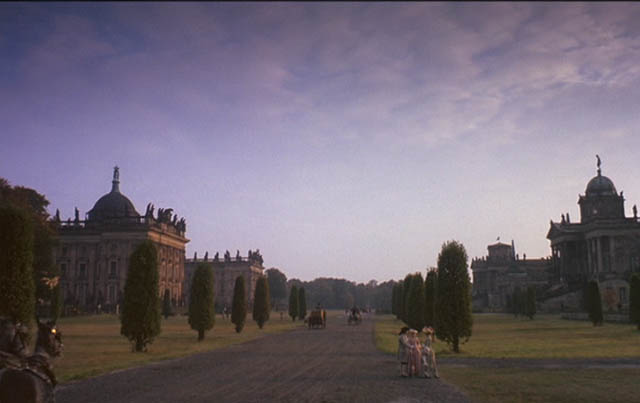
356 LS of Barry entering room and progressing to stand before the desk behind which Potzdorf's uncle is seated, Potzdorf seated to the side. (1:12:40)
NARRATION: ...its reward.
POTZDORF: Good morning, Redmond.
BARRY: Good morning, Captain Potzdorf.
POTZDORF: I should like you to meet my uncle, the Minister of Police, Herr von Potzdorf.
BARRY: Good morning, Herr Minister.
POTZDORF: Redmond, I've spoken to the Minister regarding your services and your fortune is made. We shall get you out of the Army, appoint you to the Police Bureau, and, in time, we'll allow you to move in a better sphere than that which fortune has hitherto placed you.
BARRY: Thank you, Captain Potzdorf.
357 Potzdorf and his uncle from the front. (1:13:22)
POTZDORF: Redmond, your loyalty to me and your service to the Regiment has pleased me very well. And now there is another occasion on which you may make yourself very useful to us. And, if you succeed, depend on it, your reward will be secure.
358 MCU Barry. (1:13:41)
BARRY: I'll do the best I can, sir.
359 MCU Potzdorf. (1:13:45)
POTZDORF: There's lately come to Berlin, a gentleman in the service of the Empress Queen of Austria, who calls himself the Chevalier de Balibari. He appears to follow the profession of a gambler.
360 MCU of Barry. (1:14:04)
POTZDORF: He's a libertine: fond of women, good food, polished, obliging.
361 Return to shot 359 of Potzdorf. (1:14:13)
POTZDORF: He speaks French and German indifferently. But we have some reason to fancy that this Monsieur de Balibari is a native of your country of lreland, and that he has come here as a spy.
362 MLS Barry from the side before the desk, Potzdorf rising from his chair. (1:14:32)
363 MS from front of Barry, Potzdorf to screen left. (1:14:36)
POTZDORF: Naturally, your knowledge of English makes you an ideal choice to go into his service and to find out for us whether or not he is a spy.
364 MCU of the uncle. (1:14:49)
THE UNCLE: Does this assignment interest you?
365 Return to shot 363 and resume the Mozart march. (1:14:53)
BARRY: You may be certain, Herr Minister, I'm interested in anything that can be of service to yourself and to Captain Potzdorf.
 356 |
 357 |
 358 |
 359 |
 360 |
 361 |
 362 |
 363 |
 364 |
 365 |
366 Exterior shot of building and people strolling about a plaza and garden. A carriage enters from left and crosses to the right, presumably the carriage of Potzdorf and Barry. (1:15:10 about)
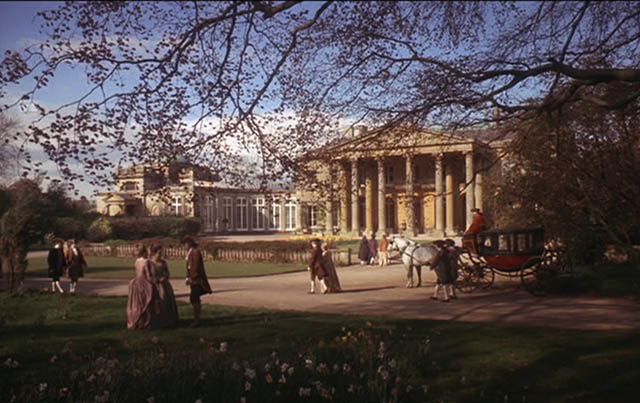
367 Interior of the carriage, Potzdorf and Barry. (1:15:14)
POTZDORF: Of course you will not know a word of English and if the Chevalier asks as to the particularity of your accent, say you are a Hungarian. You served in the war. You left the Army on account of weakness in the loins. You then served Monsieur de Quellenberg for two years. He's now with the Army in Silesia, but you'll have a certificate signed by him.
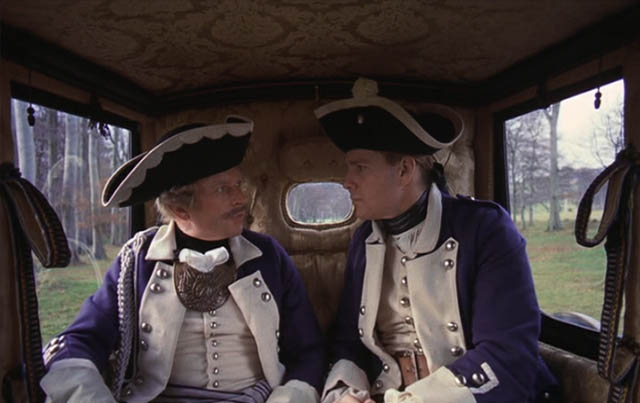
We haven't much of a chance to get to know the character of Potzdorf in the film or in Kubrick's screenplay.
After the war our regiment was garrisoned in the capital, the least dull, perhaps, of all the towns of Prussia: but that does not say much for its gaiety. Our service, which was always severe, still left many hours of the day disengaged, in which we might take our pleasure had we the means of paying for the same. Many of our mess got leave to work in trades; but I had been brought up to none: and besides, my honour forbade me; for as a gentleman, I could not soil my fingers by a manual occupation. But our pay was barely enough to keep us from starving; and as I have always been fond of pleasure, and as the position in which we now were, in the midst of the capital, prevented us from resorting to those means of levying contributions which are always pretty feasible in wartime, I was obliged to adopt the only means left me of providing for my expenses: and in a word became the ORDONNANZ, or confidential military gentleman, of my captain. I spurned the office four years previously, when it was made to me in the English service; but the position is very different in a foreign country; besides, to tell the truth, after five years in the ranks, a man's pride will submit to many rebuffs which would be intolerable to him in an independent condition.
The captain was a young man and had distinguished himself during the war, or he would never have been advanced to rank so early. He was, moreover, the nephew and heir of the Minister of Police, Monsieur de Potzdorff, a relationship which no doubt aided in the young gentleman's promotion. Captain de Potzdorff was a severe officer enough on parade or in barracks, but he was a person easily led by flattery. I won his heart in the first place by my manner of tying my hair in queue (indeed, it was more neatly dressed than that of any man in the regiment), and subsequently gained his confidence by a thousand little arts and compliments, which as a gentleman myself I knew how to employ. He was a man of pleasure, which he pursued more openly than most men in the stern Court of the King; he was generous and careless with his purse, and he had a great affection for Rhine wine: in all which qualities I sincerely sympathised with him; and from which I, of course, had my profit. He was disliked in the regiment, because he was supposed to have too intimate relations with his uncle the Police Minister; to whom, it was hinted, he carried the news of the corps.
Before long I had ingratiated myself considerably with my officer, and knew most of his affairs. Thus I was relieved from many drills and parades, which would otherwise have fallen to my lot, and came in for a number of perquisites; which enabled me to support a genteel figure and to appear with some ECLAT in a certain, though it must be confessed very humble, society in Berlin. Among the ladies I was always an especial favourite, and so polished was my behaviour amongst them, that they could not understand how I should have obtained my frightful nickname of the Black Devil in the regiment.
In the book, Barry is working both the Captain and his uncle. He helps the Captain hide from his uncle how considerably in debt he is. The uncle, seeing the confidence in which the Captain has taken Barry, asks Barry to basically inform on his nephew and let him know the real state of his nephew's affairs. Barry assures him the Captain's debts are small, which relieves the uncle and helps the Captain as his uncle pays off the debts about which he's informed. Barry is thus ingratiated to both, which helps him some, but not much. In the film we are told that Barry, if he well fulfills his duties as a spy, is promised a step up in the world (eventually), but the book makes clear that the Minister of Police, who hasn't much use for Barry's character, has told the nephew to simply promise Barry anything but has no plans to release him from the regiment.
My captain, the sly rascal! gave me a very different version of his conversation with his uncle to that which I knew to be the true one; and said smilingly to me, 'Redmond, I have spoken to the Minister regarding thy services,[Footnote: The service about which Mr. Barry here speaks has, and we suspect purposely, been described by him in very dubious terms. It is most probable that he was employed to wait at the table of strangers in Berlin, and to bring to the Police Minister any news concerning them which might at all interest the Government. The great Frederick never received a guest without taking these hospitable precautions; and as for the duels which Mr. Barry fights, may we be allowed to hint a doubt as to a great number of these combats. It will be observed, in one or two other parts of his Memoirs, that whenever he is at an awkward pass, or does what the world does not usually consider respectable, a duel, in which he is victorious, is sure to ensue; from which he argues that he is a man of undoubted honour.] and thy fortune is made. We shall get thee out of the army, appoint thee to the police bureau, and procure for thee an inspectorship of customs; and, in fine, allow thee to move in a better sphere than that in which Fortune has hitherto placed thee.
Although I did not believe a word of this speech, I affected to be very much moved by it, and of course swore eternal gratitude to the Captain for his kindness to the poor Irish castaway.
'Your service at the Dutch Minister's has pleased me very well. There is another occasion on which you may make yourself useful to us; and if you succeed, depend on it your reward will be secure.'
'What is the service, sir?' said I; 'I will do anything for so kind a master.'
'There is lately come to Berlin,' said the Captain, 'a gentleman in the service of the Empress-Queen, who calls himself the Chevalier de Balibari, and wears the red riband and star of the Pope's order of the Spur. He speaks Italian or French indifferently; but we have some reason to fancy this Monsieur de Balibari is a native of your country of Ireland. Did you ever hear such a name as Balibari in Ireland?'
'Balibari? Balyb—?' A sudden thought flashed across me. 'No, sir,' said I, 'I never heard the name.'
'You must go into his service. Of course you will not know a word of English: and if the Chevalier asks as to the particularity of your accent, say you are a Hungarian. The servant who came with him will be turned away to-day, and the person to whom he has applied for a faithful fellow will recommend you. You are a Hungarian; you served in the Seven Years' War. You left the army on account of weakness of the loins. You served Monsieur de Quellenberg two years; he is now with the army in Silesia, but there is your certificate signed by him. You afterwards lived with Doctor Mopsius, who will give you a character, if need be; and the landlord of the "Star" will, of course, certify that you are an honest fellow: but his certificate goes for nothing. As for the rest of your story, you can fashion that as you will, and make it as romantic or as ludicrous as your fancy dictates. Try, however, to win the Chevalier's confidence by provoking his compassion. He gambles a great deal, and WINS. Do you know the cards well?'
'Only a very little, as soldiers do.'
'I had thought you more expert. You must find out if the Chevalier cheats; if he does, we have him. He sees the English and Austrian envoys continually, and the young men of either Ministry sup repeatedly at his house. Find out what they talk of; for how much each plays, especially if any of them play on parole: if you can read his private letters, of course you will; though about those which go to the post, you need not trouble yourself; we look at them there. But never see him write a note without finding out to whom it goes, and by what channel or messenger. He sleeps with the keys of his despatch-box on a string round his neck. Twenty Frederics, if you get an impression of the keys. You will, of course, go in plain clothes.
Kubrick's screenplay has Barry hearing the uncle's disparaging remarks of him and that he is simply to be fed promises, which is immediately followed by an audience with the Minister of Police in which Barry is told of his new assignment spying upon the Chevalier. In the film, Kubrick breaks up the preparation of this assignment into two scenes, the one at the office of the Minister of Police and then the carriage ride. By virtue of this, Kubrick is also giving us an opportunity to repeatedly see the red carriage in which Barry and Potzdorf ride, which is the same carriage that Barry will later take to freedom.
Barry is to say he left the army due "weakness in the loins". This is Thackeray and it may have been what inclined Kubrick to consider a story relationship with Percival and the Fisher King. Being "weak in the loins" may have other meanings but it can be taken to have sexual significance. Whatever we are intended to suppose, Barry, who had saved Potzdorf, is to present himself as a character who hadn't what it took for military service.
A couple of things strike me about the scene with the uncle. One is that, during this interview, it seemed to me Potzdorf bears a certain resemblance to Ullman.
Another thing that made me think of The Shining were the individuals on the right in shot 355.

They remind me of the man and woman standing behind the door in the Gold room hall, adjacent the lobby, as Jack arrives at the Overlook.
I don't know why I feel Kubrick is referring here back to shot 355 in Barry Lyndon but I do. And perhaps he is. Consider that it is after shot 355 in Barry Lyndon that Barry has his interview with the Minister of Police, which I do think is to be compared with Jack's interview with Ullman which follows after the scene of his arrival and crossing the lobby.
As for the location of the interview with Potzdorf's uncle, it's the Powerscourt saloon at Powerscourt Estate (off L1011) (info from movie-locations.com) which was destroyed by fire in 1974 and afterward restored only partially.

Powerscourt Saloon, image from salviatimosaics.blogsport.
This same location is used for Lord Lyndon's death scene.
The view of the boulevard is from San Souci, in Potsdam (info from movie-locations.com). San Souci aerial view.
368 Grand exterior balcony to courtyard shot. (1:15:45)
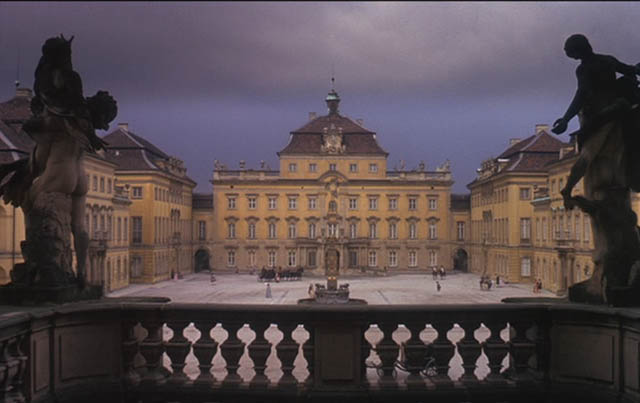
369 The drawing room of the Chevalier. Shot of him from behind as he sits at his morning breakfast. (1:15:48)
A knock and Barry enters. He greets the Chevalier, wishing him a good morning. Advances.
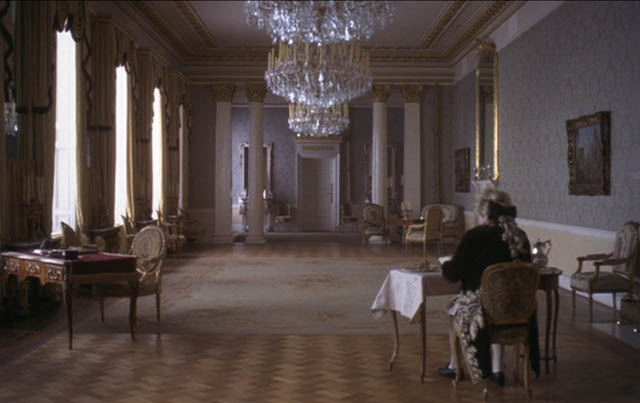
370 MCU of the Chevalier. (1:16:21)
CHEVALIER: So you are the young man recommended by Seebach. (Relying on internet script for this as it's German.)
371 Return to shot 369. (1:16:27)
BARRY: Yes, Your Honour, here are my credentials. (Relying on internet script for this as it's German.)
372 Return to shot 370 of the Chevalier. (1:16:35)
CHEVALIER: Your name is Lazlo Zilagy?
373 CU of Barry. (1:16:45)
BARRY: Yes, Your Honour.
374 Return to MCU of Chevalier. (1:16:48)
CHEVALIER: Monsieur de Quellenberg recommends you highly. (Relying on internet script for this as it's German.)
375 Return to Barry. (1:16:53)
BARRY: Monsieur is a very good man. (Relying on internet script for this as it's German.)
376 Return to Chevalier. (1:16:58)
NARRATION: It was very imprudent of him, but when Barry saw the splendor of the Chevalier's appearance, the nobleness of his manner...
377 CU of Barry. (1:17:10)
NARRATION:...he felt it impossible to keep disguise with him. Those who have never been out of their country, know little what it is to hear a friendly voice in captivity, and, as many a man, who will not understand the cause of the burst of feeling...
378 Return to Chevalier. (1:17:27)
NARRATION: ...which was now about to take place.
CHEVALIER: You seem the right one to me. (Relying on internet script for this as it's German.)
379 CU of Barry. (1:17:39)
BARRY: Thank you, Your Honour.
380 Return to Chevalier. (1:17:42)
CHEVALIER: Are you ill? (Relying on internet script for this as it's German.)
381 CU of Barry. (1:17:49)
BARRY (speaking English): Sir, I have a confession to make to you.
382 Return to the Chevalier. (1:17:58)
BARRY: I am an Irishman and my name is Redmond Barry. I was abducted into the Prussian Army two years ago, and now have been put into your service...
383 Return to Barry. (1:18:12)
BARRY: ...by my Captain Potzdorf and his uncle, the Minister of Police, to serve as a watch upon your actions and to give information to the same quarter.
Barry breaks down in tears.
384 Return to the Chevalier. (1:18:33)
385 The Chevalier rises and embraces Barry. (1:18:41)
NARRATION: The Chevalier was as much affected as Barry at thus finding one of his countrymen. For he too was an exile from home. And a friendly voice, a look, brought the old country back to his memory.
 370 |
 371 |
 372 |
 373 |
 374 |
 375 |
 376 |
 377 |
 378 |
 379 |
 380 |
 381 |
 382 |
 383 |
 384 |
 385 |
In the book, the Chevalier turns out to be a relative of Barry's. No wonder he confessed to him! And another father figure is introduced.
With these instructions, and a very small gratuity, the Captain left me. When I again saw him, he was amused at the change in my appearance. I had, not without a pang (for they were as black as jet, and curled elegantly), shaved off my moustaches; had removed the odious grease and flour, which I always abominated, out of my hair; had mounted a demure French grey coat, black satin breeches, and a maroon plush waistcoat, and a hat without a cockade. I looked as meek and humble as any servant out of place could possibly appear; and I think not my own regiment, which was now at the review at Potsdam, would have known me. Thus accoutred, I went to the 'Star Hotel,' where this stranger was,—my heart beating with anxiety, and something telling me that this Chevalier de Balibari was no other than Barry, of Ballybarry, my father's eldest brother, who had given up his estate in consequence of his obstinate adherence to the Romish superstition. Before I went in to present myself, I went to look in the remises at his carriage. Had he the Barry arms? Yes, there they were: argent, a bend gules, with four escallops of the field,—the ancient coat of my house. They were painted in a shield about as big as my hat, on a smart chariot handsomely gilded, surmounted with a coronet, and supported by eight or nine Cupids, cornucopias, and flower-baskets, according to the queer heraldic fashion of those days. It must be he! I felt quite feint as I went up the stairs. I was going to present myself before my uncle in the character of a servant!
'You are the young man whom M. de Seebach recommended?'
I bowed, and handed him a letter from that gentleman, with which my captain had taken care to provide me. As he looked at it I had leisure to examine him. My uncle was a man of sixty years of age, dressed superbly in a coat and breeches of apricot-coloured velvet, a white satin waistcoat embroidered with gold like the coat. Across his breast went the purple riband of his order of the Spur; and the star of the order, an enormous one, sparkled on his breast. He had rings on all his fingers, a couple of watches in his fobs, a rich diamond solitaire in the black riband round his neck, and fastened to the bag of his wig; his ruffles and frills were decorated with a profusion of the richest lace. He had pink silk stockings rolled over the knee, and tied with gold garters; and enormous diamond buckles to his red-heeled shoes. A sword mounted in gold, in a white fish-skin scabbard; and a hat richly laced, and lined with white feathers, which were lying on a table beside him, completed the costume of this splendid gentleman. In height he was about my size, that is, six feet and half an inch; his cast of features singularly like mine, and extremely distingue. One of his eyes was closed with a black patch, however; he wore a little white and red paint, by no means an unusual ornament in those days; and a pair of moustaches, which fell over his lip and hid a mouth that I afterwards found had rather a disagreeable expression. When his beard was removed, the upper teeth appeared to project very much; and his countenance wore a ghastly fixed smile, by no means pleasant.
It was very imprudent of me; but when I saw the splendour of his appearance, the nobleness of his manner, I felt it impossible to keep disguise with him; and when he said, 'Ah, you are a Hungarian, I see!' I could hold no longer.
'Sir,' said I, 'I am an Irishman, and my name is Redmond Barry, of Ballybarry.' As I spoke, I burst into tears; I can't tell why; but I had seen none of my kith or kin for six years, and my heart longed for some one.
...
You who have never been out of your country, know little what it is to hear a friendly voice in captivity; and there's many a man that will not understand the cause of the burst of feeling which I have confessed took place on my seeing my uncle. He never for a minute thought to question the truth of what I said. 'Mother of God!' cried he, 'it's my brother Harry's son.' And I think in my heart he was as much affected as I was at thus suddenly finding one of his kindred; for he, too, was an exile from home, and a friendly voice, a look, brought the old country back to his memory again, and the old days of his boyhood. 'I'd give five years of my life to see them again,' said he, after caressing me very warmly. 'What?' asked I. 'Why,' replied he, 'the green fields, and the river, and the old round tower, and the burying-place at Ballybarry. 'Twas a shame for your father to part with the land, Redmond, that went so long with the name.'
The Chevalier is played by Patrick Magee, the wonderful actor who also played the writer, Alexander, in A Clockwork Orange. Just as Alex accidentally found his way "home" after being beaten by the police (his former droogs), and at first found rescue, comfort and consideration at Alexander's (before taking his bath and betraying himself with his song as the criminal who earlier assaulted him and raped his wife), so do we also have Barry finding "home" with the Chevalier, who is, in the book, his uncle. Kubrick instead only has the Chevalier as a fellow countryman and thus both united by being in alien territory.
In A Clockwork Orange, by driving Alex to suicide, Alexander inadvertently aids him, for as a result of it Alex ends up in a privileged position in society. The Chevalier, too, will foster Barry into a kind of rebirth that has some correspondance to A Clockwork Orange. For, in A Clockwork Orange, not only is Alexander, the writer, set up as his creator, as if Alexander is Burgess, the two, by way of their names, can be viewed as representing the same individual symbolically. What happens with the Chevalier? Barry will assume his identity, thus escape the Prussians, and enter high society.
For an audience of the 1970s, even if one wasn't ignorant of courtly attire and the use of makeup by men, the Chevalier's appearance would have come as something as a surprise. There are members of the audience who might have questioned his "masculinity", and we need to consider again Potzdorf instructing Barry to tell the Chevalier he had left the army because of a "weakness in the loins".
The drawing room belongs to Dublin Castle (info from movie-locations.com).

From Wikipedia, the State Drawing Room, built in the 1830s, of the Dublin Castle.
The courtyard view is of Ludwisburg Palace (info from movie-locations.com).
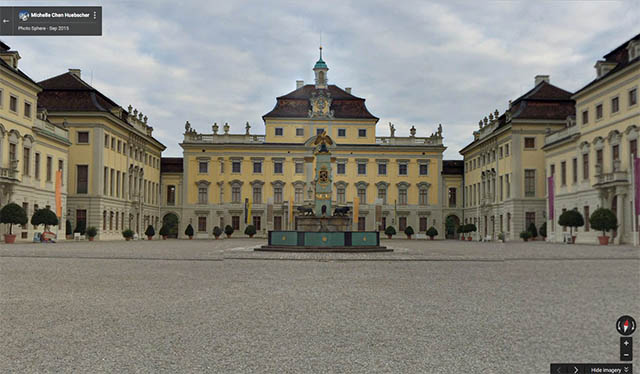
Ludwisburg Palace. From Google Photosphere of Michelle Chen Huebscher.
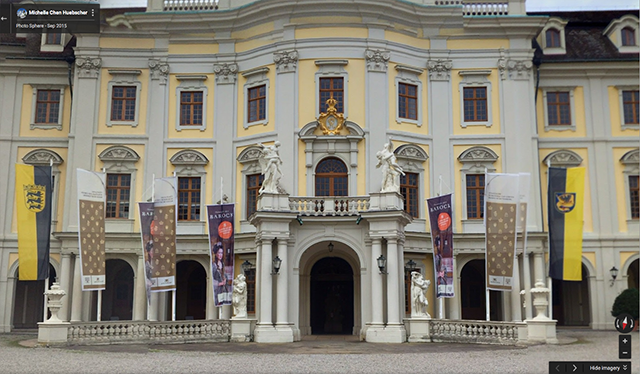
Ludwisburg Residence Courtyard Balcony. From Google Photosphere of Michelle Chen Huebscher.
386 The office of Van Potsdorf, Barry reading his diary of the Chevalier's activities. (1:19:06)
BARRY: He goes to church regularly. He's very religious and after hearing Mass he comes home for breakfast. He then takes an airing in his carriage.
NARRATION: Barry presented his reports regularly at the minister's office. The details were arranged between him and the Chevalier beforehand. He was instructed, and it is always far the best way, to tell as much truth as his story would possibly bear. It would seem that the information he gave was very minute and accurate, though not very important.
BARRY: ...but who does not acknowledge him.
 386a |
 386b |
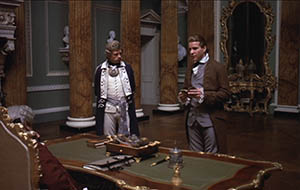 386c |
 386d |
387 Same shot as 368, now at night. Sound of horses. (1:19:46)
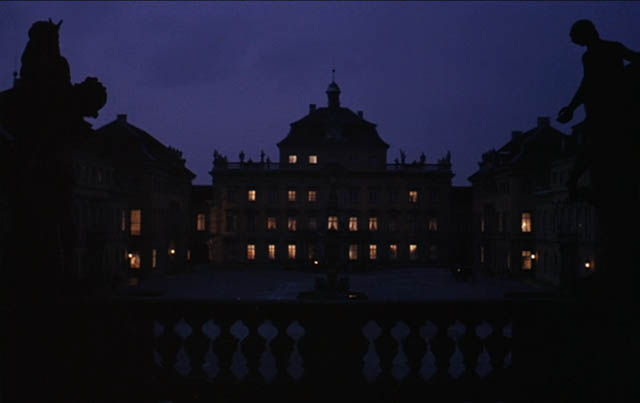
388 Gaming room, Potzdorf on the left, Barry serving. (1:19:53)
The music is The Cavatina from Il Barbiere Di Saviglia, Film Adaptation (Giovanni Paisiello) .
BARRY: Wine or punch, Your Honour?
CHEVALIER: Wine.
NARRATION: It was agreed that Barry should keep his character of valet. That, in the presence of strangers, he should not know a word of English.
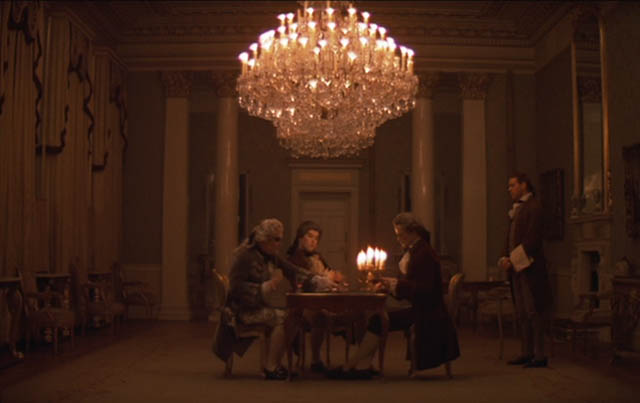
389 The Chevalier, from the Prince's left, placing down a card. (1:20:17)
NARRATION: And that he should keep a lookout on the trumps when serving the champagne and punch, and having a remarkably fine eyesight...
390 Barry crosses to the other side of the table. (1:20:23)
NARRATION: ...and a great natural aptitude, he was speedily able to give his dear patron much assistance against his opponents at the green table. If, for instance, he wiped the table with a napkin, it was to show the enemy was strong in Diamonds. If he adjusted a chair...
391 The Chevalier. (1:20:41)
NARRATION: ...it meant Ace King. If he said, "Punch or wine, My Lord?", Hearts was meant...
392 MCU of the Prince. (1:20:47)
NARRATION: ...and so forth.
The prince places down a card.
393 The Chevalier picks up a card. (1:20:52)
He puts down his cards.
394 The Prince from the Chevalier's right. (Throws down a 9 of Spades?) (1:20:59)
NARRATION: The Prince of Tübingen was a nobleman who had intimate connections with the Great Frederick...
395 The Chevalier. (1:21:07)
NARRATION: He was passionately fond of play as, indeed, were the gentlemen...
396 Scorekeeper. (1:21:11)
NARRATION: ...were the gentlemen of almost all the Courts of Europe.
SCOREKEEPER: You owe...frederick d'or. (Relying on internet script for this as it's German.)
397 The Prince. (1:21:15)
He picks up the sheet and examines it.
398 The Chevalier shuffling the cards. (1:21:25)
399 Return to shot 388 as the Prince places down the sheet. (1:21:36)
He stands.
400 CU of the Prince. (1:21:46)
PRINCE: Chevalier, though I cannot say how, I believe you have cheated me.
401 The Chevalier. (1:21:58)
CHEVALIER: I deny Your Grace's accusation and beg you to say how you have been cheated.
402 The Prince. (1:22:09)
PRINCE: I don't know but I believe I have been.
403 The Chevalier. (1:22:15)
CHEVALIER: Your Grace owes me 15,500 frederick d'or which I have honourably won.
404 The Prince. (1:22:23)
PRINCE: Chevalier, if you will have your money now you must fight for it. If you will be patient, maybe I will pay you something another time.
405 The Chevalier. (1:22:40)
CHEVALIER: Your Grace, if I am to be so tame as to take this, then I must give up an honourable and lucrative occupation.
406 The Prince. (1:22:51)
PRINCE: I have said all there is to be said. I am at your disposal
for whatever purposes you wish. Good night.
407 The room and individuals. (1:23:02)
The prince leaves.
 389 |
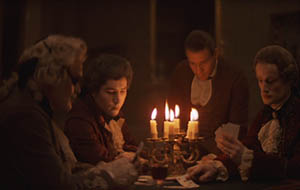 390 |
 391 |
 392 |
 393 |
 394 |
 395 |
 396 |
 397 |
 398 |
 399 |
 400 |
 401 |
 402 |
 403 |
 404 |
 405 |
 406 |
 407 |
|
Barry, a double agent, now learns better from his uncle how to act, and not only to act but to, in effect, be as a magician in the art and trickery of gambling. He learns the art of covert double language and symbolic language. Through his introduction to it, he is made aware too of when others may be using such.
My assumed dulness was perfect; and I used to make Monsieur de Potzdorff laugh with it, when I carried my little reports to him at the Garden-house outside the town where he gave me rendezvous. These reports, of course, were arranged between me and my uncle beforehand. I was instructed (and it is always far the best way) to tell as much truth as my story would possibly bear. When, for instance, he would ask me, 'What does the Chevalier do of a morning?'
'He goes to church regularly' (he was very religious), 'and after hearing mass comes home to breakfast. Then he takes an airing in his chariot till dinner, which is served at noon. After dinner he writes his letters, if he have any letters to write: but he has very little to do in this way. His letters are to the Austrian envoy, with whom he corresponds, but who does not acknowledge him; and being written in English, of course I look over his shoulder. He generally writes for money. He says he wants it to bribe the secretaries of the Treasury, in order to find out really where the alloyed ducats come from; but, in fact, he wants it to play of evenings, when he makes his party with Calsabigi, the lottery-contractor, the Russian attaches, two from the English embassy, my Lords Deuceace and Punter, who play a jeu d'enfer, and a few more. The same set meet every night at supper: there are seldom any ladies; those who come are chiefly French ladies, members of the corps de ballet. He wins often, but not always. Lord Deuceace is a very fine player. The Chevalier Elliot, the English Minister, sometimes comes, on which occasion the secretaries do not play. Monsieur de Balibari dines at the missions, but en petit comite, not on grand days of reception. Calsabigi, I think, is his confederate at play. He has won lately; but the week before last he pledged his solitaire for four hundred ducats.'
'Do he and the English attaches talk together in their own language?'
'Yes; he and the envoy spoke yesterday for half-an-hour about the new danseuse and the American troubles: chiefly about the new danseuse.'
It will be seen that the information I gave was very minute and accurate, though not very important.
...
It was agreed that I should keep my character of valet; that in the presence of strangers I should not know a word of English; that I should keep a good look-out on the trumps when I was serving the champagne and punch about; and, having a remarkably fine eyesight and a great natural aptitude, I was speedily able to give my dear uncle much assistance against his opponents at the green table. Some prudish persons may affect indignation at the frankness of these confessions, but Heaven pity them! Do you suppose that any man who has lost or won a hundred thousand pounds at play will not take the advantages which his neighbour enjoys? They are all the same. But it is only the clumsy fool who CHEATS; who resorts to the vulgar expedients of cogged dice and cut cards. Such a man is sure to go wrong some time or other, and is not fit to play in the society of gallant gentlemen; and my advice to people who see such a vulgar person at his pranks is, of course, to back him while he plays, but never—never to have anything to do with him. Play grandly, honourably. Be not, of course, cast down at losing; but above all, be not eager at winning, as mean souls are. And, indeed, with all one's skill and advantages, winning is often problematical; I have seen a sheer ignoramus that knows no more of play than of Hebrew, blunder you out of five thousand pounds in a few turns of the cards. I have seen a gentleman and his confederate play against another and HIS confederate. One never is secure in these cases: and when one considers the time and labour spent, the genius, the anxiety, the outlay of money required, the multiplicity of bad debts that one meets with (for dishonourable rascals are to be found at the play-table, as everywhere else in the world), I say, for my part, the profession is a bad one; and, indeed, have scarcely ever met a man who, in the end, profited by it. I am writing now with the experience of a man of the world. At the time I speak of I was a lad, dazzled by the idea of wealth, and respecting, certainly too much, my uncle's superior age and station in life.
There is no need to particularise here the little arrangements made between us; the playmen of the present day want no instruction, I take it, and the public have little interest in the matter. But simplicity was our secret. Everything successful is simple. If, for instance, I wiped the dust off a chair with my napkin, it was to show that the enemy was strong in diamonds; if I pushed it, he had ace, king; if I said, 'Punch or wine, my Lord?' hearts was meant; if 'Wine or punch?' clubs. If I blew my nose, it was to indicate that there was another confederate employed by the adversary; and THEN, I warrant you, some pretty trials of skill would take place. My Lord Deuceace, although so young, had a very great skill and cleverness with the cards in every way; and it was only from hearing Frank Punter, who came with him, yawn three times when the Chevalier had the ace of trumps, that I knew we were Greek to Greek, as it were.
408 CU of Von Potzdorf in his office. (1:23:23)
UNCLE POTZDORF: Was the Prince cheated?
409 LS from back of Barry standing between Von Potzdorf and his nephew. (1:23:29)
BARRY: In as far as I am able to tell of such things, Minister, no. I believe the Chevalier won the money fairly.
POTZDORF: What are the Chevalier's intentions?
BARRY: I'm not sure. The Prince told him quite clearly that if he wished to have his money he'd have to fight for it.
UNCLE POTZDORF: A meeting with the Prince is impossible.
410 MS Barry from front. (1:23:55)
BARRY: The Prince had left him only that choice.
411 Von Potzdorf from beyond Barry's left. (1:24:00 about)
412 Potzdorf rises and steps over to speak with his uncle, seen from Barry's right. (1:24:06 about)
A bell begins to ring, about 11 times, in between the 3rd and 4th ring goes to 413 and with 6th to 414. Is heard clearly 10 times before dialogue begins again.
413 MS of Barry. (1:24:10)
414 Herr von Potzdorf and Captain Potzdorf from beyond Barry's left. (1:24:16)
UNCLE POTZDORF: Now, will you be able to return here tomorrow without arousing suspicion?
 408 |
 409 |
 410 |
 411 |
 412 |
 413 |
 414 |
|
415 MS of Barry and the Chevalier seated on the end of his bed. (1:24:26)
CHEVALIER:I know they won't allow a meeting with the Prince. But if I say that, do you know any reason why he'll pay me the money he owes me? You must tell them I intend to demand satisfaction. And don't look so downcast, my boy. There's no harm they can do to me, my friends in the Austrian Embassy will see to that. The worst they can do is send me out of this dreary country of theirs. And f they should, make your mind easy, you shall not be left behind. Have no fear of that.
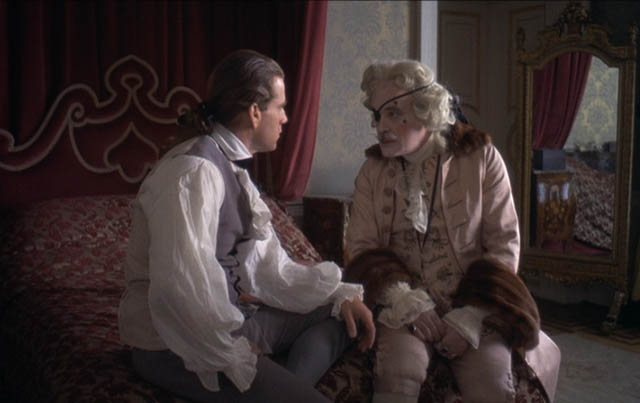
416 Von Potzdorf from Barry's right, in his office. (1:24:59)
UNCLE POTZDORF:The King has determined to send the Chevalier out of the country. Has he already demanded satisfaction?
417 MLS from behind and left of Von Potzdorf, showing Barry and the Captain. (1:25:08)
BARRY: Not yet, Herr Minister, but I believe he intends to, possibly today.
UNCLE POTZDORF: Then this must be done tomorrow.
POTZDORF: All the arrangements are made. Redmond, you said that he takes a drive...
418 MS Potzdorf and Barry. (1:26:24)
POTZDORF: ...in his carriage after breakfast every day.
BARRY: Yes, sir.
POTZDORF: Is there any reason to believe that he'll do any different tomorrow?
BARRY: No, sir.
POTZDORF: Good. When the Chevalier comes out to his carriage tomorrow morning, two officers will meet him and escort him to the frontier.
419 Uncle Potzdorf from Barry's right. (1:25:46)
POTZDORF: His baggage will be sent after him.
UNCLE POTZFORF: Excellent.
 416 |
 417 |
 418 |
 419 |
420 Exterior of the Chevalier's loding, a carriage in front. (1:25:50)
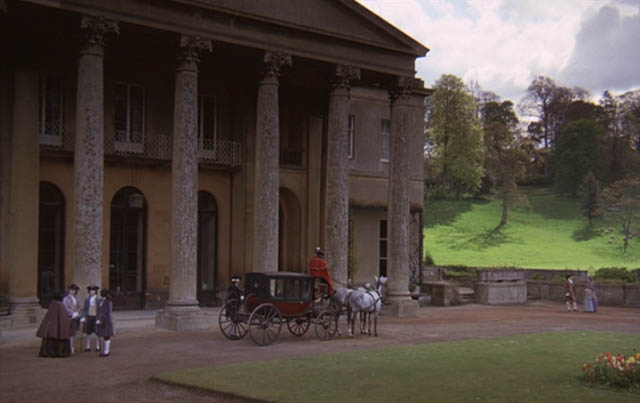
421 Interior. (1:25:55)
We hear footsteps, Barry, impersonating the Chevalier, enters from the right and the camera pans as he crosses and exits left.
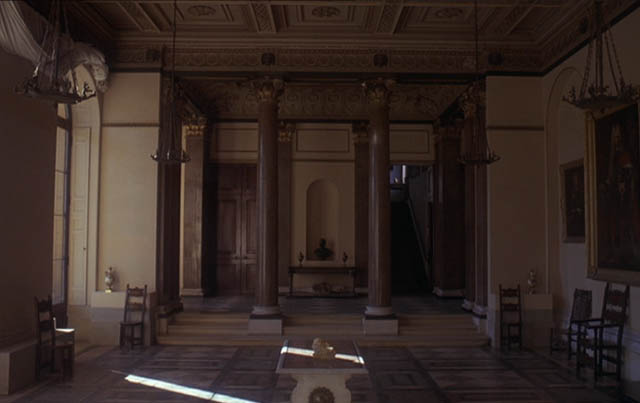
NARRATION: At ten o'clock the next morning, the Chevalier de Balibari went out for his regular morning drive.
422 The carriage. Barry enters the scene from the right. (1:26:12)
BARRY: Where is my servant, Lazlo?
PRUSSIAN SOLDIER: I will let down the steps for Your Honour.
BARRY: What is the meaning of this?
PRUSSIAN SOLDIER: Please get inside, your Honor.
BARRY: Am I under arrest?
PRUSSIAN SOLDIER: We are going to drive to the frontier.
423 MS of Barry from the soldier's right. (1:26:42)
BARRY: To the frontier? But I'm on my way to the Austrian Ambassador's house.
PRUSSIAN SOLDIER: I am sorry, your honor, but my orders are to escort you to the frontier and see you safely across the border.
BARRY: But, I'm not going to the frontier. I'm going to the Austrian Ambassador's house. I have very important business there.
PRUSSIAN SOLDER: My orders are to take Your Honor to the frontier by any means which may be necessary. But if you come along willingly, I am to give you this purse on behalf of the Prince of Tübingen, containing 2000 frederick d'or.
424 Barry enters the carriage. (1:27:18)
BARRY: All Europe shall hear of this.
 422 |
 423 |
 424 |
|
425 Return to LS of the exterior of the lodgings, the carriage pulling away. (1:27:23)
NARRATION: And so, without papers or passport, and under the eyes
of two Prussian Officers, Barry was escorted across the frontier into Saxony and freedom. The Chevalier himself had uneventfully crossed the frontier the night before.
And exit with the March from the Idomeneo, which had first entered when Barry was receiving his 2 frederick d'or for saving Potzdorf's life.
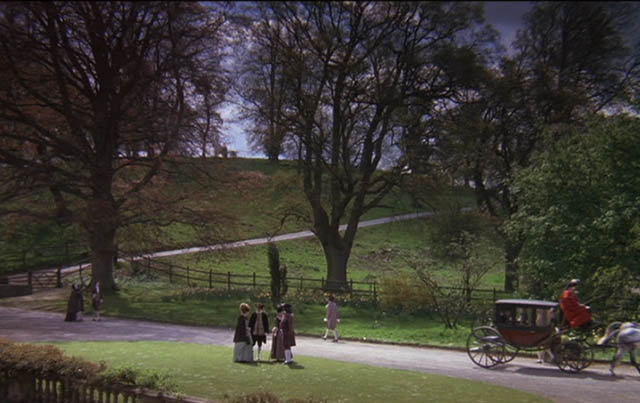
So does Barry escape as I previously described.
In the book, Barry's assuming the disguise is connected with his first adoption of the identity of another via Fakenham.
When it became known, however, to the officers of the garrison that there was a faro-table in town, they were wild to be admitted to the sport; and, in spite of my entreaties to the contrary, my uncle was not averse to allow the young gentlemen their fling, and once or twice cleared a handsome sum out of their purses. It was in vain I told him that I must carry the news to my captain, before whom his comrades would not fail to talk, and who would thus know of the intrigue even without my information.
'Tell him,' said my uncle.
'They will send you away,' said I; 'then what is to become of me?'
'Make your mind easy,' said the latter, with a smile; 'you shall not be left behind, I warrant you. Go take a last look at your barracks, make your mind easy; say a farewell to your friends in Berlin. The dear souls, how they will weep when they hear you are out of the country; and, as sure as my name is Barry, out of it you shall go!'
'But how, sir?' said I.
'Recollect Mr. Fakenham of Fakenham,' said he knowingly. ''Tis you yourself taught me how. Go get me one of my wigs. Open my despatch-box yonder, where the great secrets of the Austrian Chancery lie; put your hair back off you forehead; clap me on this patch and these moustaches, and now look in the glass!'
'The Chevalier de Balibari,' said I, bursting with laughter, and began walking the room in his manner with his stiff knee.
The next day, when I went to make my report to Monsieur de Potzdorff, I told him of the young Prussian officers that had been of late gambling; and he replied, as I expected, that the King had determined to send the Chevalier out of the country.
'He is a stingy curmudgeon,' I replied; 'I have had but three Frederics from him in two months, and I hope you will remember your promise to advance me!'
'Why, three Frederics were too much for the news you have picked up,' said the Captain, sneering.
'It is not my fault that there has been no more,' I replied. 'When is he to go, sir?'
'The day after to-morrow. You say he drives after breakfast and before dinner. When he comes out to his carriage, a couple of gendarmes will mount the box, and the coachman will get his orders to move on.'
'And his baggage, sir?' said I.
'Oh! that will be sent after him. I have a fancy to look into that red box which contains his papers, you say; and at noon, after parade, shall be at the inn. You will not say a word to any one there regarding the affair, and will wait for me at the Chevalier's rooms until my arrival. We must force that box. You are a clumsy hound, or you would have got the key long ago!'
I begged the Captain to remember me, and so took my leave of him. The next night I placed a couple of pistols under the carriage seat; and I think the adventures of the following day are quite worthy of the honours of a separate chapter.
...
Fortune smiling at parting upon Monsieur de Balibari, enabled him to win a handsome sum with his faro-bank.
At ten o'clock the next morning, the carriage of the Chevalier de Balibari drew up as usual at the door of his hotel; and the Chevalier, who was at his window, seeing the chariot arrive, came down the stairs in his usual stately manner.
'Where is my rascal Ambrose?' said he, looking around and not finding his servant to open the door.
'I will let down the steps for your honour,' said a gendarme, who was standing by the carriage; and no sooner had the Chevalier entered, than the officer jumped in after him, another mounted the box by the coachman, and the latter began to drive.
'Good gracious!' said the Chevalier, 'what is this?'
'You are going to drive to the frontier,' said the gendarme, touching his hat.
'It is shameful—infamous! I insist upon being put down at the Austrian Ambassador's house!'
'I have orders to gag your honour if you cry out,' said the gendarme.
'All Europe shall hear of this!' said the Chevalier, in a fury.
'As you please,' answered the officer, and then both relapsed into silence.
The silence was not broken between Berlin and Potsdam, through which place the Chevalier passed as His Majesty was reviewing his guards there, and the regiments of Bulow, Zitwitz, and Henkel de Donnersmark. As the Chevalier passed His Majesty, the King raised his hat and said, 'Qu'il ne descende pas: je lui souhaite un bon voyage.' The Chevalier de Balibari acknowledged this courtesy by a profound bow.
They had not got far beyond Potsdam, when boom! the alarm cannon began to roar.
'It is a deserter,' said the officer.
'Is it possible?' said the Chevalier, and sank back into his carriage again.
Hearing the sound of the guns, the common people came out along the road with fowling-pieces and pitchforks, in hopes to catch the truant. The gendarmes seemed very anxious to be on the look-out for him too. The price of a deserter was fifty crowns to those who brought him in.
'Confess, sir,' said the Chevalier to the police officer in the carriage with him, 'that you long to be rid of me, from whom you can get nothing, and to be on the look-out for the deserter who may bring you in fifty crowns? Why not tell the postilion to push on? You may land me at the frontier and get back to your hunt all the sooner.' The officer told the postillion to get on; but the way seemed intolerably long to the Chevalier. Once or twice he thought he heard the noise of horse galloping behind: his own horses did not seem to go two miles an hour; but they DID go. The black and white barriers came in view at last, hard by Bruck, and opposite them the green and yellow of Saxony. The Saxon custom-house officers came out.
'I have no luggage,' said the Chevalier.
'The gentleman has nothing contraband,' said the Prussian officers, grinning, and took their leave of their prisoner with much respect.
The Chevalier de Balibari gave them a Frederic apiece.
'Gentlemen,' said he, 'I wish you a good day. Will you please to go to the house whence we set out this morning, and tell my man there to send on my baggage to the "Three Kings" at Dresden?'
Then ordering fresh horses, the Chevalier set off on his journey for that capital. I need not tell you that I was the Chevalier.
In the novel, the Chevalier stays behind and is there when Potzdorf tries to open his box, first trying keys which will not work, then smashing it with a hammer. The Chevalier smashes a water jug over his head and cries out that there are thieves in the place. And where is his servant? The Chevalier is kept prisoner for a day but is then released, simply asked to leave and keep silent about the matter, and given some compensation.
Idomeneo, by Wofgang Amadeus Mozart (premiered 1781) concerns events following the Trojan War. The story is similar to that of Agamemnon, who sacrificed his daughter, Iphigenia, to appease Artemis so that his army could sail to Troy.
Electra, a daughter of Agamemnon's, appears in this story, she known for having plotted with her brother against their mother, Clytemnestra, for the murder of Agamemnon after his return from Troy. The murder of Agamemnon had been Clytemnestra's vengeance for the death of Iphigenia.
Idomeneo, King of Crete, is lost at sea as he returns home, then saved by Neptune who washes him to shore. Idomeneo's promise is to sacrifice to Neptune the first living being he meets, which, of course, turns out to be someone he loves, his son, Idamante, who he doesn't immediately recognize. When he does realize who it is, hoping to save him, he severs ties with Idamante, telling him he never wants to see him again. Sending him into exile, he also orders him to take Electra home, but a sea serpent appears and keeps the ship from sailing.
In Act 3, Idamente learns why his father has exiled him, and kills the sea serpent that Neptune had sent in penalty for Idomeneo having neglected to make his sacrifice. Idamante offers himself for sacrifice then his lover, Ilia, daughter of King Priam, offers to take his place. Neptune makes his voice heard, declining any sacrifice, instead demanding that Idomeneo give his throne over to Idamante and Ilia due their bravery. According to Wikipedia, Electra is the only one not left happy. She continues to wish for her death, but I am confused why she is even in this story in the first place.
Another version of the Iphigenia story has a deer being substituted in her stead as the sensibilities of the audience had grown to be horrified by human sacrifice. Idomeneo takes the same path, Neptune appeased by Idamente having offered his life, Ilia as well, but not requiring any sacrifice.
Very interesting to me is the somewhat confusing view we are given of the Chevalier's living arrangement.
Here, in shot 355, we are shown where the Minister of the Police would be.

In shot 366 Potzdorf and Barry's carriage (the red one) is shown with this classic facade in the background.

The carriage crosses before this facade, leaving it behind, and Barry and Potzdorf discuss how Barry is to behave with the Chevalier, not knowing a word of English etc., just as he is not to know a word of English later when he is aiding the Chevalier in his gambling.
We are then shown this facade, immediately before Barry is introduced to the Chevalier, so we are to assume the Chevalier lives here.

In shot 387 we are again shown this facade, but at night, immediately preceding the scene of the Chevalier gambling at night in his rooms. So, once again, we are given reason to believe the Chevalier lives here.

Shot 388 is of the Chevalier's rooms at night.

These columns and lay-out are much in the same spirit as the first floor through which Barry/the Chevalier exits when leaving his residence.

And what is outside in shots 420 and 425?


This is the same classical facade and garden environs as observed back in shot 366.

Are we intended to believe this is the exterior facade of the residence while an alternate courtyard facade is shown in shots 368 and 387? It would seem so. The location of the classical facade is as yet unknown to me.
Approx 17,100 words or 35 single-spaced pages. A 131 minute read at
Next: Barry Lyndon Analysis - Part 4
Go to Table of Contents for Analysis of Barry Lyndon
Link to the main TOC page for all the analyses